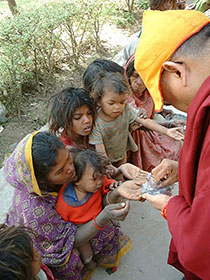- Home
- FPMT Homepage
Foundation for the Preservation of the Mahayana Tradition
The FPMT is an organization devoted to preserving and spreading Mahayana Buddhism worldwide by creating opportunities to listen, reflect, meditate, practice and actualize the unmistaken teachings of the Buddha and based on that experience spreading the Dharma to sentient beings. We provide integrated education through which people’s minds and hearts can be transformed into their highest potential for the benefit of others, inspired by an attitude of universal responsibility and service. We are committed to creating harmonious environments and helping all beings develop their full potential of infinite wisdom and compassion. Our organization is based on the Buddhist tradition of Lama Tsongkhapa of Tibet as taught to us by our founders Lama Thubten Yeshe and Lama Thubten Zopa Rinpoche.
- Willkommen
Die Stiftung zur Erhaltung der Mahayana Tradition (FPMT) ist eine Organisation, die sich weltweit für die Erhaltung und Verbreitung des Mahayana-Buddhismus einsetzt, indem sie Möglichkeiten schafft, den makellosen Lehren des Buddha zuzuhören, über sie zur reflektieren und zu meditieren und auf der Grundlage dieser Erfahrung das Dharma unter den Lebewesen zu verbreiten.
Wir bieten integrierte Schulungswege an, durch denen der Geist und das Herz der Menschen in ihr höchstes Potential verwandelt werden zum Wohl der anderen – inspiriert durch eine Haltung der universellen Verantwortung und dem Wunsch zu dienen. Wir haben uns verpflichtet, harmonische Umgebungen zu schaffen und allen Wesen zu helfen, ihr volles Potenzial unendlicher Weisheit und grenzenlosen Mitgefühls zu verwirklichen.
Unsere Organisation basiert auf der buddhistischen Tradition von Lama Tsongkhapa von Tibet, so wie sie uns von unseren Gründern Lama Thubten Yeshe und Lama Thubten Zopa Rinpoche gelehrt wird.
- Bienvenidos
La Fundación para la preservación de la tradición Mahayana (FPMT) es una organización que se dedica a preservar y difundir el budismo Mahayana en todo el mundo, creando oportunidades para escuchar, reflexionar, meditar, practicar y actualizar las enseñanzas inconfundibles de Buda y en base a esa experiencia difundir el Dharma a los seres.
Proporcionamos una educación integrada a través de la cual las mentes y los corazones de las personas se pueden transformar en su mayor potencial para el beneficio de los demás, inspirados por una actitud de responsabilidad y servicio universales. Estamos comprometidos a crear ambientes armoniosos y ayudar a todos los seres a desarrollar todo su potencial de infinita sabiduría y compasión.
Nuestra organización se basa en la tradición budista de Lama Tsongkhapa del Tíbet como nos lo enseñaron nuestros fundadores Lama Thubten Yeshe y Lama Zopa Rinpoche.
A continuación puede ver una lista de los centros y sus páginas web en su lengua preferida.
- Bienvenue
L’organisation de la FPMT a pour vocation la préservation et la diffusion du bouddhisme du mahayana dans le monde entier. Elle offre l’opportunité d’écouter, de réfléchir, de méditer, de pratiquer et de réaliser les enseignements excellents du Bouddha, pour ensuite transmettre le Dharma à tous les êtres. Nous proposons une formation intégrée grâce à laquelle le cœur et l’esprit de chacun peuvent accomplir leur potentiel le plus élevé pour le bien d’autrui, inspirés par le sens du service et une responsabilité universelle. Nous nous engageons à créer un environnement harmonieux et à aider tous les êtres à épanouir leur potentiel illimité de compassion et de sagesse. Notre organisation s’appuie sur la tradition guéloukpa de Lama Tsongkhapa du Tibet, telle qu’elle a été enseignée par nos fondateurs Lama Thoubtèn Yéshé et Lama Zopa Rinpoché.
Visitez le site de notre Editions Mahayana pour les traductions, conseils et nouvelles du Bureau international en français.
Voici une liste de centres et de leurs sites dans votre langue préférée
- Benvenuto
L’FPMT è un organizzazione il cui scopo è preservare e diffondere il Buddhismo Mahayana nel mondo, creando occasioni di ascolto, riflessione, meditazione e pratica dei perfetti insegnamenti del Buddha, al fine di attualizzare e diffondere il Dharma fra tutti gli esseri senzienti.
Offriamo un’educazione integrata, che può trasformare la mente e i cuori delle persone nel loro massimo potenziale, per il beneficio di tutti gli esseri, ispirati da un’attitudine di responsabilità universale e di servizio.
Il nostro obiettivo è quello di creare contesti armoniosi e aiutare tutti gli esseri a sviluppare in modo completo le proprie potenzialità di infinita saggezza e compassione.
La nostra organizzazione si basa sulla tradizione buddhista di Lama Tsongkhapa del Tibet, così come ci è stata insegnata dai nostri fondatori Lama Thubten Yeshe e Lama Zopa Rinpoche.
Di seguito potete trovare un elenco dei centri e dei loro siti nella lingua da voi prescelta.
- 欢迎 / 歡迎
简体中文
“护持大乘法脉基金会”( 英文简称:FPMT。全名:Foundation for the Preservation of the Mahayana Tradition) 是一个致力于护持和弘扬大乘佛法的国际佛教组织。我们提供听闻,思维,禅修,修行和实证佛陀无误教法的机会,以便让一切众生都能够享受佛法的指引和滋润。
我们全力创造和谐融洽的环境, 为人们提供解行并重的完整佛法教育,以便启发内在的环宇悲心及责任心,并开发内心所蕴藏的巨大潜能 — 无限的智慧与悲心 — 以便利益和服务一切有情。
FPMT的创办人是图腾耶喜喇嘛和喇嘛梭巴仁波切。我们所修习的是由两位上师所教导的,西藏喀巴大师的佛法传承。
繁體中文
護持大乘法脈基金會”( 英文簡稱:FPMT。全名:Found
ation for the Preservation of the Mahayana Tradition ) 是一個致力於護持和弘揚大乘佛法的國際佛教組織。我們提供聽聞, 思維,禪修,修行和實證佛陀無誤教法的機會,以便讓一切眾生都能 夠享受佛法的指引和滋潤。 我們全力創造和諧融洽的環境,
為人們提供解行並重的完整佛法教育,以便啟發內在的環宇悲心及責 任心,並開發內心所蘊藏的巨大潛能 — 無限的智慧與悲心 – – 以便利益和服務一切有情。 FPMT的創辦人是圖騰耶喜喇嘛和喇嘛梭巴仁波切。
我們所修習的是由兩位上師所教導的,西藏喀巴大師的佛法傳承。 察看道场信息:
- FPMT Homepage
- News/Media
-
- Study & Practice
-
-
- About FPMT Education Services
- Latest News
- Programs
- New to Buddhism?
- Buddhist Mind Science: Activating Your Potential
- Heart Advice for Death and Dying
- Discovering Buddhism
- Living in the Path
- Exploring Buddhism
- FPMT Basic Program
- FPMT Masters Program
- FPMT In-Depth Meditation Training
- Maitripa College
- Lotsawa Rinchen Zangpo Translator Program
- Universal Education for Compassion & Wisdom
- Online Learning Center
-
- Prayers & Practice Materials
- Overview of Prayers & Practices
- Full Catalogue of Prayers & Practice Materials
- Explore Popular Topics
- Benefiting Animals
- Chenrezig Resources
- Death & Dying Resources
- Lama Chopa (Guru Puja)
- Lama Zopa Rinpoche: Compendium of Precious Instructions
- Lama Zopa Rinpoche: Life Practice Advice
- Lama Zopa Rinpoche Practice Series
- Lamrim Resources
- Mantras
- Prayer Book Updates
- Purification Practices
- Sutras
- Thought Transformation (Lojong)
- Audio Materials
- Dharma Dates - Tibetan Calendar
- Translation Services
- Publishing Services
- Ways to Offer Support
- Prayers & Practice Materials
-
- Teachings and Advice
- Find Teachings and Advice
- Lama Zopa Rinpoche Advice Page
- Lama Zopa Rinpoche: Compendium of Precious Instructions
- Lama Zopa Rinpoche Video Teachings
- ༧སྐྱབས་རྗེ་བཟོད་པ་རིན་པོ་ཆེ་མཆོག་ནས་སྩལ་བའི་བཀའ་སློབ་བརྙན་འཕྲིན།
- Podcasts
- Lama Yeshe Wisdom Archive
- Buddhism FAQ
- Dharma for Young People
- Resources on Holy Objects
- Teachings and Advice
-
-
*If a menu item has a submenu clicking once will expand the menu clicking twice will open the page.
-
-
- Centers
-
- Teachers
-
- Projects
-
-
-
-
*If a menu item has a submenu clicking once will expand the menu clicking twice will open the page.
-
-
- FPMT
-
-
-
-
-
Use problems as ornaments, seeing them as extremely precious, because they make you achieve enlightenment quickly, by getting you to achieve bodhicitta. Experience these problems on behalf of all sentient beings, giving all happiness to sentient beings. This is the ornament.
Lama Zopa Rinpoche
-
-
-
- Shop
-
-
-
The Foundation Store is FPMT’s online shop and features a vast selection of Buddhist study and practice materials written or recommended by our lineage gurus. These items include homestudy programs, prayers and practices in PDF or eBook format, materials for children, and other resources to support practitioners.
Items displayed in the shop are made available for Dharma practice and educational purposes, and never for the purpose of profiting from their sale. Please read FPMT Foundation Store Policy Regarding Dharma Items for more information.
-
-
FPMT Community: Stories & News
1
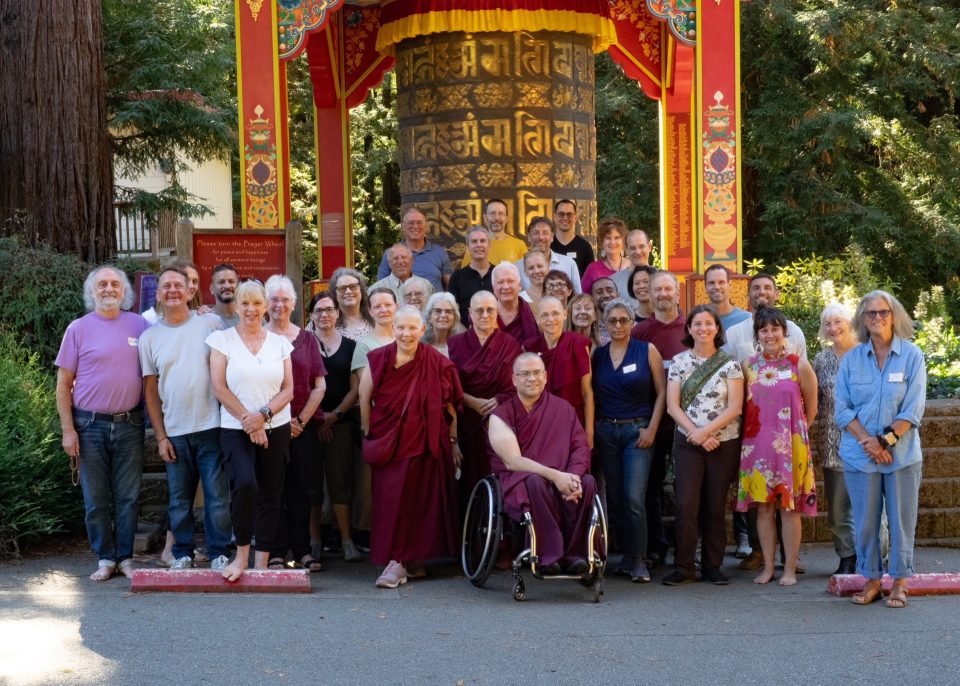
Onsite participants in the FPMT Latin and North America Meeting Regional Consultation at Land of Medicine Buddha. Photo by John Golson.
From September 6-8, 2024 the FPMT North America and Latin America’s 2004 regional consultation was held at Land of Medicine Buddha in Soquel, CA, USA. North American Regional Coordinator, Melissa Kaye, and Director of Thubten Norbu Ling in Santa Fe, NM, Nina Highfill, share the following update on this event which joyfully reunited participants with a shared purpose.
Melissa Kaye reflects: “After five long years of virtual connections, the air was thick with excitement as members of FPMT’s North American region joyfully reunited in person. As I walked into the beautiful, historic Land of Medicine Buddha (LMB) gompa in Soquel, California on the chilly Friday evening, I felt a little uneasy. As the new North American Regional Coordinator, I was not sure whether one weekend would be enough time to break the ice and come together as a region. But the moment I stepped into the room, it was all smiles, hugs and words of welcome and support. The networking and bonding among us began immediately, and there was a palpable sense of belonging and anticipation. We had an eventful weekend in front of us.”
The North American Regional Meeting took place September 6-8, 2024, and was beautifully and expertly hosted by LMB. Representatives from nearly all 27 North American centers, projects, services and study groups attended the hybrid meeting, including 33 in-person participants, some of whom traveled very far to be with us. One participant shared, “Traveling 3,000 miles to be here was worth every moment; the warmth and camaraderie felt like coming home.”’ We also took advantage of technology with more than 20 attending at least some sessions online.
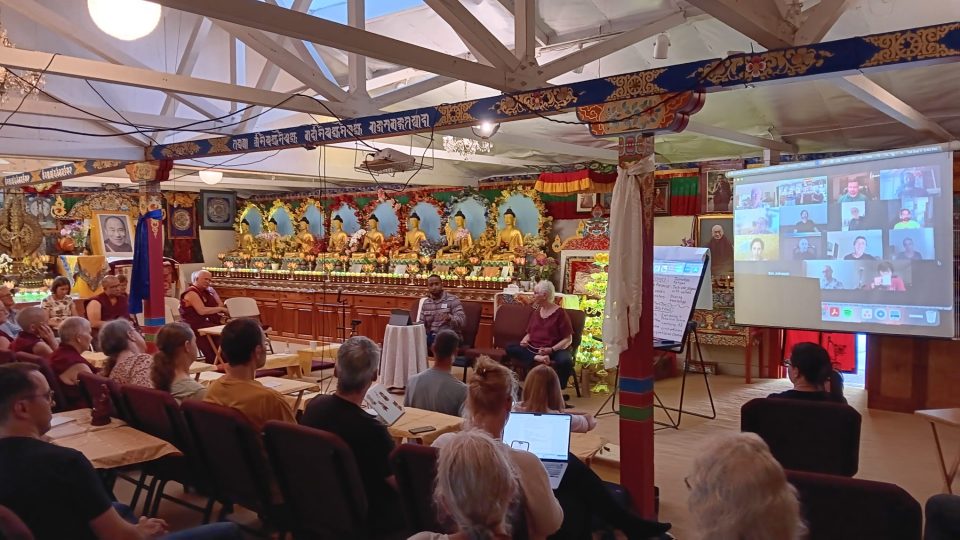
Discussions during the recent NARM meeting at LMB. Photo by François Lecointre
During the first half of the weekend meeting, we were joined by members of the FPMT Inc. Board (Paula de Wys, Dale Davis and Karuna Cayton) and International Office (Teacher/Center Services Director François Lecointre) who led us in discussions on the topic of “Advancing Our Gurus’ Vision of a World Guided by Compassion and Wisdom.” Six members from five centers of FPMT’s Latin America region also joined us online for these discussions, which were part of the FPMT Inc. Board’s regional consultations paving the way to CPMT 2025.
After a Friday night overview of the FPMT Inc. Board’s consultation work completed thus far, Saturday morning saw us diving deep into four crucial areas shaping FPMT’s path forward: Education and Universal Education, Community Services and Interfaith Dialogue, Modern Approaches and Technology, and Leadership.
We broke into small focus groups, each tackling one of these vital topics. The atmosphere was buzzing with energy and ideas, as participants shared insights, debated possibilities and crafted innovative proposals. It was inspiring to witness the collective wisdom of our community at work, each person eagerly contributing their unique perspective to help shape FPMT’s future, even foregoing tea breaks to continue their discussions.
These small group sessions weren’t just theoretical exercises. Our proposals, along those from other regional consultations, will be further refined and consolidated, forming the foundation for deeper explorations at the upcoming CPMT gathering in April 2025. This collaborative process embodies the spirit of co-creation, ensuring that our organization’s future is shaped by the diverse voices of our global community. As one participant aptly put it, “The tone was lovely; everything felt very reciprocal and everyone felt invited to be engaged.” It’s clear that the future of FPMT is in passionate, capable hands.
The second portion of our regional meeting took place on Sunday when we discussed a three-year plan for our region, including ideas for expanding teacher tours, offering region-wide online education programs, modernizing our regional digital content, and increasing center collaboration and training.
Again, there was a great deal of enthusiastic discussion among the participants and tremendous support for expanding regional collaboration and activities. Feedback from the participants included: “Having nearly everyone in person was wonderful. Having breakout sessions to work through topics really helped bond with people from other centers” and “Wonderful to meet fellow FMPT folks from the region, absolutely lovely. Also glad to be able to zoom in to the event and attend at least a small part.”
Throughout the weekend there was an overwhelming sense of new energy and enthusiasm in the room and online. We are so much stronger and can achieve so much more when we work together for the benefit of all sentient beings. And as we were laughing and brainstorming with each other, we realized that offering service together is also a lot more fun!
We look forward to continuing these collaborative discussions and meeting with even more of you next year at Kopan for CPMT 2025!
The last of the four regional consultations planned in 2024 to pave the way for the CPMT 2025 took place at Tara Institute in Melbourne, on October 26 and 27, with representatives, onsite or online from almost all centers, projects, and services from Australia and New Zealand. We look forward to sharing an update on this meeting very soon.
Foundation for the Preservation of Mahayana Tradition (FPMT), is a Tibetan Buddhist organization dedicated to the transmission of the Mahayana Buddhist tradition and values worldwide through teaching, meditation and community service.
- Tagged: fpmt north america
31
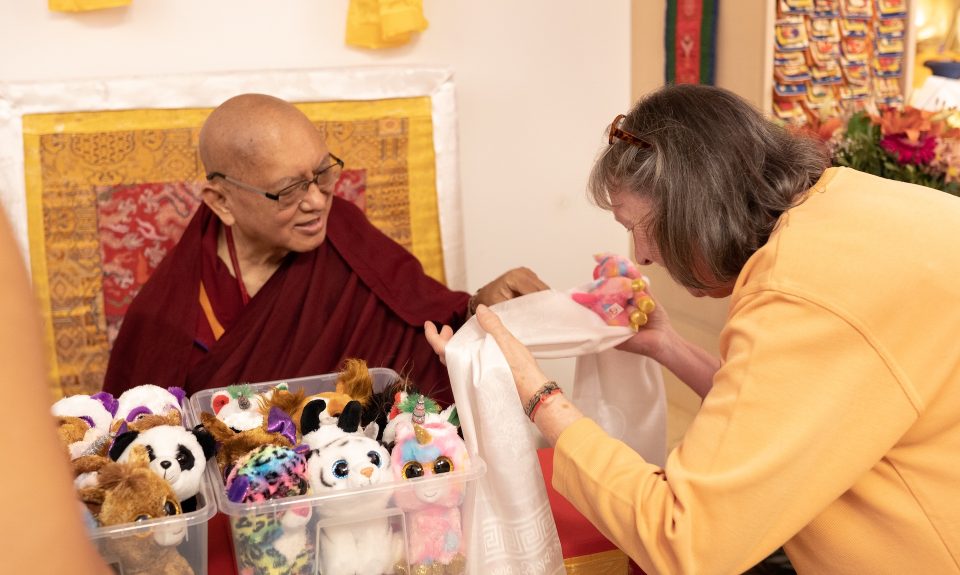
Inge Siebenwurst offering a khata to Lama Zopa Rinpoche in Munich during Rinpoche’s 2018 European Tour. Photo courtesy of Aryatara Institute.
Inge Siebenwurst, passed away on October 22, 2024 in Bavaria, Germany, after a short and serious illness with cancer.
Aryatara Institute submitted a moving obituary for Inge and would like to express their gratitude and appreciation for her. “Inge was a pillar of the Aryatara Institute for many years, her dedication and tireless commitment have made a deep impression and left joyful memories for many members and visitors of the Aryatara Institute.”
A Pillar of the Center
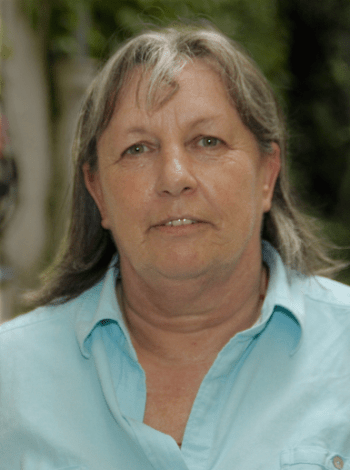
Portrait of Inge Siebenwurst, photo courtesy of Aryatara Institute.
Inge joined the center in 2004, started the Discovering Buddhism course, and soon started volunteering. She didn’t have to be asked, she simply did what was needed. For many years, Inge was at the heart of many practical aspects of our center life. In charge of the preparations, for many years she was the first to open the doors and the last to put out the lights. For 20 years she contributed tirelessly in various capacities.
Spiritual Program Coordinator and Board Member
She proved her organizational skills especially during her time as Spiritual Program Coordinator (2011-2013) and as a core board member (2007-2011 and 2012-2014). In these positions, she played a key role in defining the central topics of the center. Time and again, she impressively demonstrated how important and beneficial personal commitment, good organization and, above all, harmonious cooperation are for spiritual growth and the community.
Major Events and Visits from Lamas
Her commitment to the planning and implementation of major events and teacher visits has been remarkable. She was involved in the Maitreya Loving Kindness Tour (2004, 2008, 2015) and the Sera Lachi and Ngari monk tours (2012, 2015, 2017), and played a key role in the visits of Tenzin Osel Hita (2017), Lama Zopa Rinpoche (2018), Jhado Rinpoche and H.E. Ling Rinpoche (2023), and most recently, in May of this year during the visit of Khandro Tseringma Rinpoche in Munich.
She took on any task that needed to be done, from creating promotional materials, organizing event equipment, driving the teachers, decorating the altar, and much more.
In addition, Inge’s warm-hearted nature and organizational skills not only created a dignified atmosphere for the visiting teachers, but also promoted team spirit and harmony among the many volunteers.
Taking Care of Teachers
Inge’s commitment to the center was evident in the early years when Ven. Fedor came to Munich in 2007 as a Resident Teacher. Wherever she could, she offered her support and was significantly involved in finding a new teacher’s apartment in 2013. She also looked after various visiting teachers such as Ven. Tharchin and Ven. Tony.
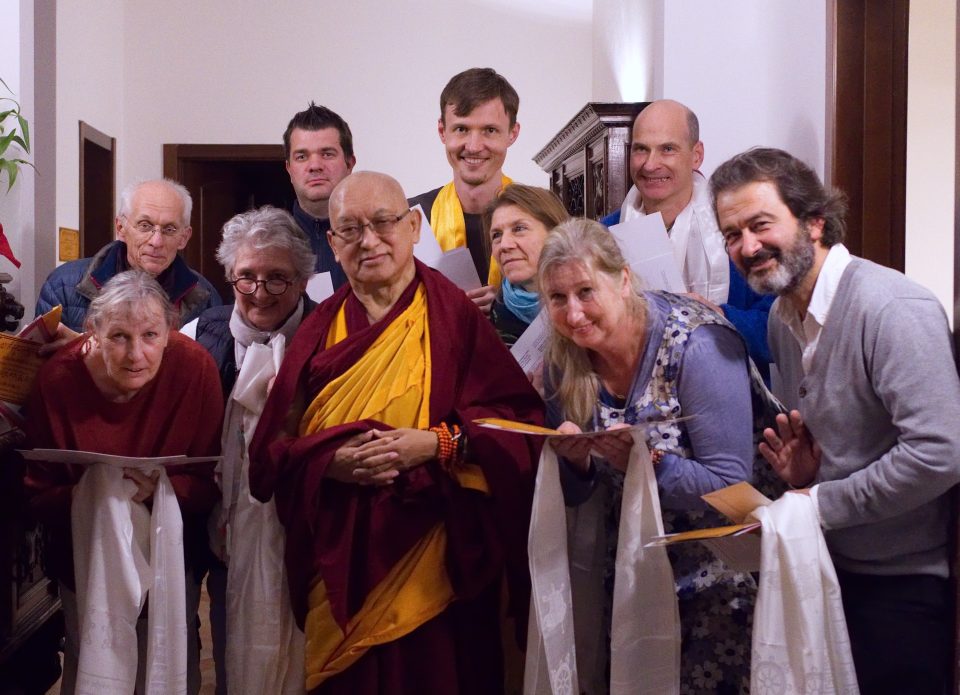
Inge (bottom left) at the100 Million Mani Retreat at ITLK, Italy, 2017. Photo courtesy of Aryatara Institute.
Aryatara Publications
Her extraordinary commitment also showed in the field of publications, where she played a crucial role in publications for over 14 years: as coordinator, layout designer, translator. and proofreader to many essential texts which help to preserve the teachings of Lama Zopa Rinpoche and Lama Yeshe and make them easily accessible to those interested. And to ensure that these publications reach as many people as possible, copies were also sent to German-speaking centers. This too was largely done by Inge, who packed the parcels, took them to the post office, and covered the postage costs without even mentioning it.
Transcription and Distance Learning
With equal dedication, Inge wrote almost 200 transcripts for the FPMT Basic Program and Discovering Buddhism over a period of 12 years—an achievement that is incredibly remarkable in itself. Not only does it require an enormous amount of time (at least 8 hours per transcript) and commitment, but the result—making the words of one’s own teachers available to others so that course participants can read them again and again—is invaluable.
In addition, the transcripts of the lectures of the study programs also form the basis for the distance learning program offered by the Aryatara Institute. For many years, Inge looked after the distance learning students, sent them the teaching materials, answered questions, etc.
Programs, Newsletters, Website
For several years, Inge was responsible for the creation of the programs, the layout of the newsletters and their distribution as well as significantly involved in the creation of the current website, which she also managed for several years.
Leading Events and Retreats
Inge was not only active behind the scenes in many areas, she also led meditations and practices such as the Tsog Guru Puja, as well as Tara and Medicine Buddha practice on a regular basis for many years. She led the Tara Easter retreat for three years, enabling participants to experience the healing practice of Tara in depth. With her empathetic nature, she created a safe space of peace and trust where people could connect and support each other in their practice.
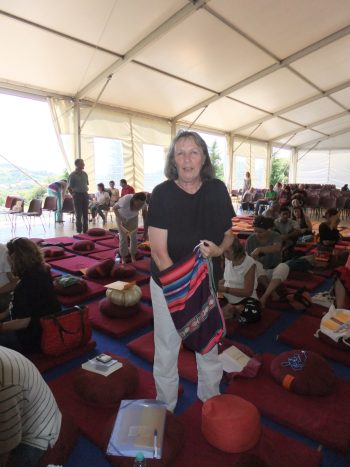
Inge attending retreat in 2014. Photo courtesy of Aryatara Institute.
An Inspiring Practitioner
Inge was not only a tireless volunteer, she was also a long-time student and an inspiring practitioner at the center. She participated in the FPMT Basic Program for Advanced Practitioners, first with Geshe Soepa and later with Ven. Fedor. She devoted herself intensively to the study of profound Buddhist teachings including five years of lamrim study, four years of the Bodhisattvacharyavatara and in-depth study of many other topics and texts. Her interest and dedication to her studies were amazing.
Student of Lama Zopa Rinpoche
Last but not least, she was a truly devoted student of Lama Zopa Rinpoche, whose retreats she attended whenever she could: 2009 in France (6 weeks), 2014 in Italy (3 weeks), 2015 in the Netherlands (2 weeks) and 2017 in Italy (4 weeks). Rinpoche’s visit to Munich in 2018 was certainly a particularly joyful event for her, to the success of which she contributed in the aforementioned way.
Through her manifold but always humble activities for the Aryatara Institute, Inge put into practice one of Lama Zopa Rinpoche’s most important teachings—to understand “service” to others, and especially to Dharma centers, as a path to enlightenment as only when there are places where Dharma is taught can we develop wisdom and compassion. Inge recognized this and for over 20 years she actively supported the center and all those who benefit from it.
A Valued Friend and Companion

Inge with her grandchild, 2022. Photo courtesy of Aryatara Institute.
Inge’s warm nature, her openness for conversation and her ability to inspire and encourage others made her a valued friend and companion to many.
Her work was marked by genuine devotion to the Dharma and a sincere desire to benefit others. Her exemplary tireless dedication, deep practice and genuine commitment will continue to inspire us and be remembered with gratitude. She was a role model for many of us and will remain so.
During the pandemic, Inge moved from Munich to the countryside with her son and daughter-in-law. Her visits to the center became less frequent, but the bond remained. In 2022, her grandson was born, a new task for Inge. As a result of her move, she no longer worked as much for the center, but she saw the support for her family as her practice. She taught her little grandson the mantra OM MANI PADME HUM and showed him how to do light offerings.
Practice for Inge
On Thursday, October 24, 2024, two days after Inge’s death, the Aryatara community performed a Medicine Buddha puja for her at the center. We individually informed people close to her about the puja and around 30 people attended. If you would have liked to be there but were not informed, please accept our apologies. In the short time available and due to our sadness about Inge’s death, we may not have thought of all the people who were also close to her.
All are welcome to offer practice for Inge from home, many resources can be found here, particularly Medicine Buddha practice: Death and Dying: Practices and Resources (fpmt.org/death/).
We would like to note that Inge was also involved in the creation of this information we share with you today. May she continue on the Bodhisattva path with the blessings of the Buddhas and always be guided by perfect Mahayana teachers!
Written by Aryatara Institute, we offer grateful thanks for this inspiring tribute.
Please pray that Inge Siebenwurst may never ever be reborn in the lower realms, may she be immediately born in a pure land where she can be enlightened or to receive a perfect human body, meet the Mahayana teachings and meet a perfectly qualified guru and by only pleasing the guru’s mind, achieve enlightenment as quickly as possible. More advice from Lama Zopa Rinpoche on death and dying is available, see Death and Dying: Practices and Resources (fpmt.org/death/).
To read more obituaries from the international FPMT mandala, and to find information on submission guidelines, please visit our new Obituaries page (fpmt.org/media/obituaries/).
- Tagged: obituaries, obituary
23

Geshe Tsultrim leading the lantern parade at the Big Love Festival. Photo courtesy of CI.
On September 26-28, Chenrezig Institute, the first Tibetan Buddhist Dharma center in Australia, and one of the oldest in the West, celebrated its 50th anniversary serving sentient beings with a joyous Big Love Festival. We are so happy to share this inspiring report of the event from Chenrezig Institute:
Founded in September 1974, Chenrezig Institute was the first Tibetan Buddhist center established outside the Indian subcontinent by The Foundation for the Preservation of the Mahayana Tradition (FPMT). The institute has flourished into a dedicated facility for Buddhist education and practice, where sentient beings can come to learn Dharma, meditate, purify and collect merits.

Closing ceremony of the Big Love Festival for Chenrezig Institute’s 50th anniversary celebration. Photo courtesy of CI.
The Big Love Festival was held on the vast grounds of Chenrezig Institute, between September 26-28. The festival brought together highly respected Buddhist teachers such as resident Chenrezig Institute teacher Geshe Phuntsok Tsultrim, Khenrinpoche Geshe Chonyi, Geshe Tenzin Zopa, Tenzin Osel Hita, two geshemas—including Geshema Namdol Phuntsok, the main teacher and chant leader at Kopan Nunnery—and many other geshes and special guests who facilitated and attended the celebrations from around the world. Furthermore, Ven. Roger Kunsang, the Chief Executive Officer (CEO) of FPMT Inc, attended and oversaw the celebrations and ceremonies throughout the festival.

Sera Je monks working on the Chenrezig sand mandala. Photo courtesy of CI.
Six geshes from Sera Je Monastery attended Chenrezig Institute both before and during the Big Love Festival, offering their precious time and experience. The Sera monks performed a rare and powerful puja before the festival to honor the Dharma protectors and extensive offerings and prayers were given. Before the festival commenced, they worked on the Medicine Buddha sand mandala, and during the festival they constructed the sand mandala of Chenrezig, Buddha of Compassion, in the gompa.

Buddha statue at the new gompa land blessing. Photo courtesy of CI.

Crystal stupa containing Lama Zopa Rinpoche’s holy relics. Photo courtesy of CI.
There were spontaneous and very auspicious moments happening during the three days of the festival.
- On the first day, a Buddha statue from India arrived at the new gompa land, sponsored by a Korean group who were also present. Twenty-seven geshes and all Sangha present offered a blessing ceremony.
- On the second day of the festival, the Kangyur and Tengyur miraculously arrived unexpectedly.
- On the third day, Lama Zopa Rinpoche’s holy relics were placed into a very beautiful crystal stupa that arrived that day. The crystal stupa was hand crafted by artists in China.
Throughout the festival, Tibetan thangka master, Phenpo Tendhar, exhibited a body of artwork in the gompa. He also offered workshops alongside the great artist Pema; both offering their time and skills to support the development of Tibetan art in the West.
Other events throughout the festival included: a Lama Tsongkhapa bhumtsok puja led by Geshe Tenzin Zopa, vibrant Q & A panels, geshe debates and conversations in the Nalanda Masters Garden, guided meditation yoga sessions, Dharma Kids activities in the mornings and the afternoons, inspirational talks, and workshops in the Garden of Enlightenment.
The attendees of the festival rejoiced in a Tibetan songs and dance performance with Topgyal and Tsering, chanting with the Sera Je monks, art displays, live music performances, a Welcome to Country with Aunty Bridgette Chilly Davis, and an impressive lantern parade light offering at dusk, culminating with a beautiful evening concert with Sacred Earth.

Lama Tsongkhapa bumtsok puja. Photo courtesy of CI.
The event not only honored the institute’s legacy but also reinforced its commitment to nurturing compassion and wisdom in the hearts of attendees, bringing together a diverse community united in celebration of love, peace, and spiritual growth.
With grateful thanks to Chenrezig Institute’s director, Cheng Hong Quek, and acting SPC Thubten Kunphen, for providing the details of this joyful celebration.
Are you an FPMT center, study group, or project that has a joyful or inspiring story to share with the FPMT community? We’d love to hear it!
Foundation for the Preservation of Mahayana Tradition (FPMT), is a Tibetan Buddhist organization dedicated to the transmission of the Mahayana Buddhist tradition and values worldwide through teaching, meditation and community service.
- Tagged: 50th anniversary, chenrezig institute
18
October 2024 e-News is now Available!
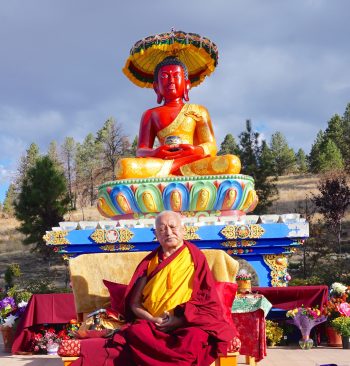
Lama Zopa Rinpoche offering a teaching before the 2016 Amitabha Buddha Festival, Buddha Amitabha Pure Land, Washington State, USA. Photo by Ven. Lobsang Sherab.
This month’s e-news brings you important news, updates, and causes for rejoicing including:
- An update on the Stupa of Complete Victory
- Teachings from Lama Yeshe and Lama Zopa Rinpoche
- An update from the FPMT Board of Directors
- Newly available and revised materials for your practice
- News on the recent Amitabha Buddha Festival in Washington State
- Grants for healthcare and essential services in 2024
- Changes and opportunities within the FPMT organization
- An update on Land of Medicine Buddha’s 100,000 Stupa project
- How to help the devastating situation in Thame
And so much more!
Please read this month’s e-news in its entirety.
Visit our subscribe page to receive the monthly FPMT International Office e-News directly in your email inbox.
Foundation for the Preservation of Mahayana Tradition (FPMT), is a Tibetan Buddhist organization dedicated to the transmission of the Mahayana Buddhist tradition and values worldwide through teaching, meditation and community service.
- Tagged: enews, fpmt enews
11
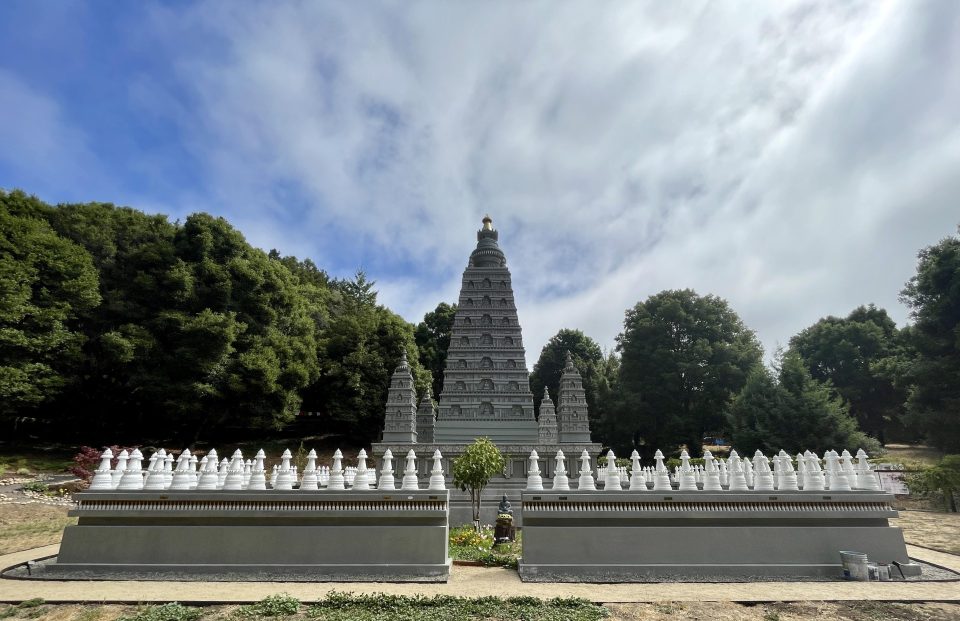
Mahabodhi Stupa with the row of Kadampa stupas, from the back. Photo courtesy of the 100,000 Stupa Project.
On the advice of Lama Zopa Rinpoche, Land of Medicine Buddha (LMB) has been building a 39-foot-tall Mahabodhi Stupa in California. This stupa will be the main attraction of the 100,000 Stupa Project in a beautiful garden featuring an area to meditate, thousands of memorial stupas, places to perform prostrations, and areas with spots for reflection and contemplation. This is a project first conceived by Rinpoche in the late 90s, and breaking ground in 2014 to begin construction. We recently received some exciting updates from Project Manager Denice Macy on this incredible holy object project and we invite you to read the below report and rejoice!
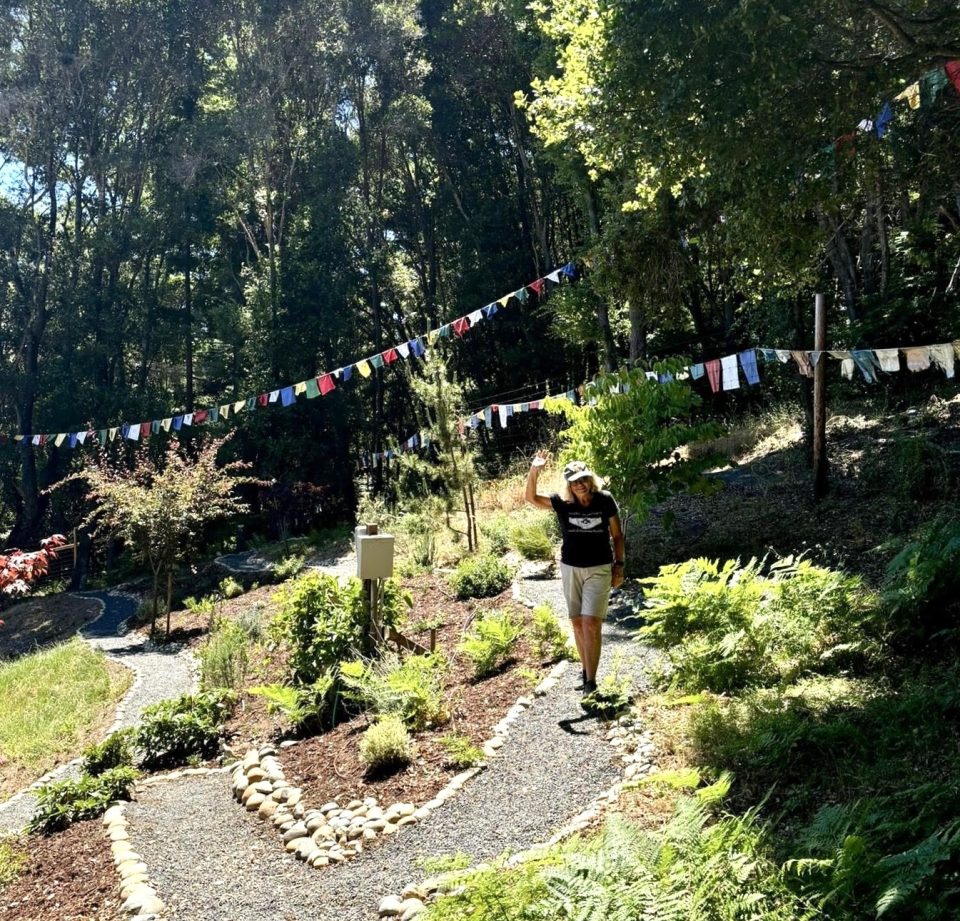
Project Manager Denice Macy waves from the grounds of the Stupa Project.
What Was Accomplished from 2020 to Present
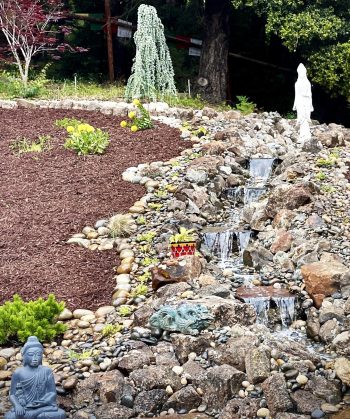
River of Nectar. Photo courtesy of the 100,000 Stupa Project.
Fulfilling two of Lama Zopa Rinpoche’s pieces of advice:
- Garden/grounds: A River of Nectar flows! When Rinpoche came to inspect the Stupa Project in 2019, he discussed with the Project Manager, Denice Macy, ideas for beautifying the grounds. Before the 2019 visit, Rinpoche had mentioned that a Japanese style of garden would be pleasing. As Rinpoche and Denice discussed ideas for landscaping, Rinpoche expressed the wish for a river with mantras placed inside to bless any beings who drink or touch the water. With input from feng shui master Peter Lung, a River of Nectar arose. Water flows slowly down the hillside, over six mini waterfalls. At each waterfall is placed a stone carved with the OM MANI PADME HUM mantra. The mantra stones are carved in six languages: Tibetan, English, Chinese, Vietnamese, Hindi, and Mongolian. Statues, dragons, and other animals—from Lama Zopa Rinpoche’s house in Aptos—were placed along the banks of the river.
- Lighting the Stupa: Following Rinpoche’s advice, colored lights in the four directions were installed during Losar this year and offered every evening as well as blue lights inside the shrine. The five color lights correspond to the colors of the five tathagatas.
Work on the Stupa continues:
- Main Stupa: Gelek Sherpa continues to apply decorative panels to our Mahabodhi Stupa. All the scaffolding have been removed and he is currently working on the ground level preparing thirty-six niches where Buddhas and Taras will reside.
- Large Kadampa Stupas: This summer we completed the casting, filling, and mounting of the large Kadampa stupas on our first mandala wall – 146 stupas in. Of these, approximately fifty stupas remain available for sponsorship. This year we have opened opportunities for stupa reservation in advance. Several stupas have been reserved with two that include not only the blessed ashes of the stupa sponsor, but also of their dog!
- Small Kadampa Stupas: Our mandala wall was built to hold many stupas, with four horizontal niches running lengthwise to house five-inch stupas. We received the first batch of 1,200 five-inch Kadampa stupas in 2023. We held two mantra rolling parties to create mantra rolls of the Four Dharmakaya Relic Mantras and filled these stupas with mantras and incense. These small stupas have been mounted on the mandala wall. Sponsors names will be written on a sign at the stupa site. Of these +1,000 stupas we have found sponsors for 300 stupas. Rejoice!

Shakyamuni Buddha and Green Tara statues which will be placed in all the niches on the ground floor of the Mahabodhi Stupa. Photo courtesy of the 100,000 Stupa Project.
What is Planned for 2025 and Beyond
- Main Stupa: Buddhas and Taras, oh my! Big News! This year we sought advice on the type of statues to place in the niches on the ground floor of our Mahabodhi Stupa. Thankfully, Venerable Roger was able to consult Khandro-la (Rangjung Neljorma Khadro Namsel Drönme), who advised: “It is very good if you have in all the spaces (niches) Buddha Shakyamuni in one and next Green Tara, so alternate these two statues in all the ‘niches’ available. This is very good, especially for the success, quick success, of Lama Zopa Rinpoche’s Holy Wishes.” With the invaluable help of Kabir from Root Institute, we were able to enlist Ratnakar, a talented sculptor in Rajasthan, India, to create eighteen sculptures each of Shakyamuni Buddha and Green Tara. We anticipate the statues will be ready to ship to us in January 2025. The statues then will be mounted onto the niches with a verse placed beneath. We will be opening up sponsorship opportunities for these Buddhas and Taras in the coming year.
- Completion of the Main Stupa: We anticipate the main stupa will be completed in the fall of 2026.
- Enshrinement and Consecration: We are thrilled over the moon to hear that our Mahabodhi Stupa will be the home of the holy tooth relics of our most precious Lama Zopa Rinpoche in the America continent. Venerable Roger wishes that we have a grand consecration once the Mahabodhi Stupa is complete and we are ready to enshrine Rinpoche’s holy tooth relic. We will be inviting lamas, benefactors, and students from around the world for a day of blessings and rejoicing.
One of Lama Zopa Rinpoche’s Vast Visions is to have 100,000 stupas around the world and we rejoice in being a part of fulfilling his holy wish.
With grateful thanks to Denice Macy for this inspiring report!
Learn more about the 100,000 Stupa Project: https://landofmedicinebuddha/100000-stupa-project/
Foundation for the Preservation of Mahayana Tradition (FPMT), is a Tibetan Buddhist organization dedicated to the transmission of the Mahayana Buddhist tradition and values worldwide through teaching, meditation and community service.
- Tagged: holy object, land of medicine buddha, stupas, vast visions
8
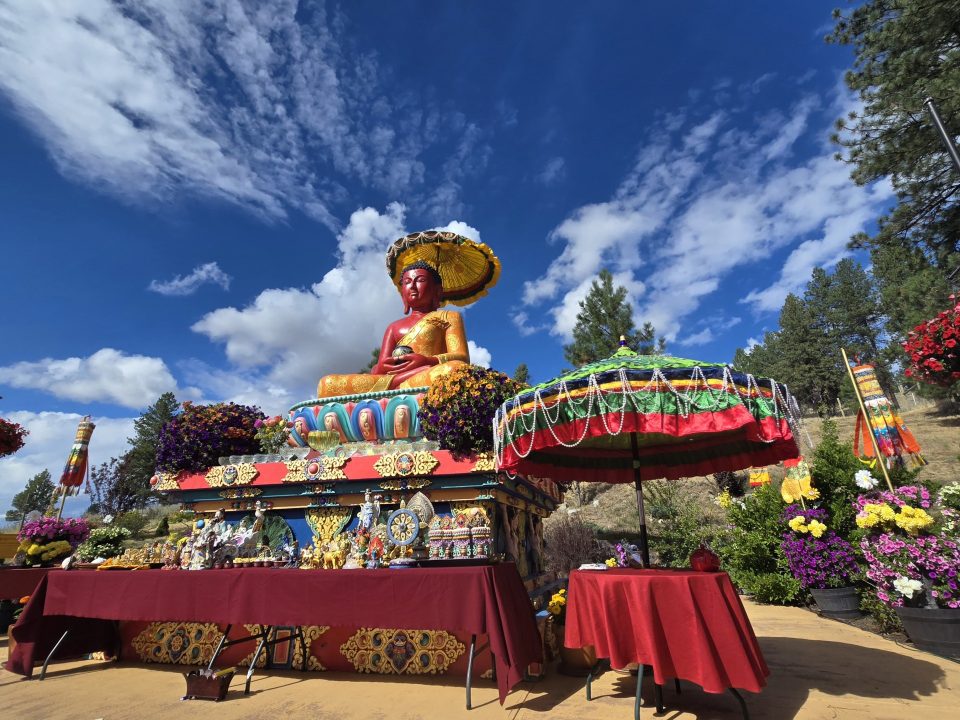
Amitabha Budda statue and altar at Buddha Amitabha Pure Land, Washington State, USA. September 14, 2014. Photo by Julia Sanderson.
After a week of preparations, Buddha Amitabha Pure Land (BAPL), in Washington State, USA, hosted an Amitabha Buddha Festival for the seventh time, attended by thirty people. The festival was envisioned by Lama Zopa Rinpoche to honor the large Amitabha Buddha statue which is on the land at BAPL. Rinpoche created the text for the celebration, basing it on Lama Tsongkhapa’s text for the Monlam celebration. The text includes an extensive bath offering, prayers to the 35 Buddhas of Confession, and an extensive offering practice, similar to one done during a long life puja.
The local FPMT center, Pamtingpa, is located about an hour from Buddha Amitabha Pure Land, and students from there, as well as from friends from a nearby town, helped prepare food and set everything up for the puja.
Yangsi Rinpoche accepted an invitation to attend this festival and led a beautiful motivation before the puja began, reminding everyone how much effort Lama Zpoa Rinpoche had put into creating this festival, compiling the festival text, and the details Rinpoche put into making sure all of the offerings were of best quality and beautifully arranged—all so that students would have the opportunity to create extensive merit. Yangsi Rinpoche also emphasized that all of this merit would be dedicated for the quick return of Lama Zopa Rinpoche and for the welfare of all beings.

Ven. Thubten Wongmo with Yangsi Rinpoche, Buddha Amitabha Pure Land, September 14. Photo by Julia Sanderson.
The puja itself starts off with refuge and bodhicitta, bath offering, then the extensive prayer to the Thirty-Five Buddhas, “The Flowing Water of the Ganga, a Thorough Praise of the Thirty-Five Sugatas,” which lists the various negative karmas that each of the thirty-five buddhas purifies.
Next in the text, all of the various traditional offerings are made to Guru Amitabha: The three Dharma robes and begging bowl, the seven objects of a King’s reign, the eight auspicious signs and substances etc. For lots of the offerings Lama Zopa Rinpoche advised to have many of the same offering available. Rinpoche said to do this so that the organizers could hand them out and everyone could participate in actually physically making the offerings. Rinpoche advised to have actual representations of each of the offerings made, and personally bought many of them, including many small horses, elephants, giant umbrellas, banners, representations of kings, queens, ministers, etc. Many people attending are not necessarily Buddhist but Ven. Tenzin Tharchin, a monk who resides at Buddha Amitabha Buddha Land, noticed that, “Everyone really gets into the puja and they enjoy very much participating in making the offerings.”
Two of the last offering verses were composed by Lama Zopa Rinpoche himself: “Offering Trucks, Cars, Trains, and Other Vehicles,” and “Offering Airplanes.” Ven. Tharchin shares, “The toy car that Yangsi Rinpoche offered for the first of these made a sound of a car speeding along faster and faster and then pulling the handbrake into a screeching turn! Rinpoche kept playing the sound effects while all the other toy vehicles were being handed out to the others which caused everyone to crack up with laughter!”
Offering Trucks, Cars, Trains, and Other Vehicles
Due to the merits of having offered these vehicles
May ourselves and all transmigratory beings
Realize the basis of the two truths.
(The truth for the absolute wisdom and the truth for the all obscuring mind)
And by completing the path method possessed by wisdom and wisdom possessed by method
Cross from beyond the oceans of samsaric suffering and
May the unified holy body and mind of Buddha be achieved.
Offering Airplanes
Due to the method of having offered these airplanes
And especially by the blessings of the Virtuous Friend,
The essence of embodiment of numberless Buddhas.
May ourselves and all transmigratory beings actualize the unification
Of holy body and holy mind of no more learning
In the brief lifetime of degenerated time.
Thus, may all the wishes of the students, the benefactors, the benefactors of the Dharma centers, the sentient beings who rely on me, those whom I have promised to pray for, those whose names have been given to me, and those who merely see us, hear us, remember us, touch us, talk to us, see photos of us, and dream of us, be fulfilled in accordance with the Dharma. At the time of our death, may we see Amitabha directly, and be able to go without obstruction to the Blissful Realm.
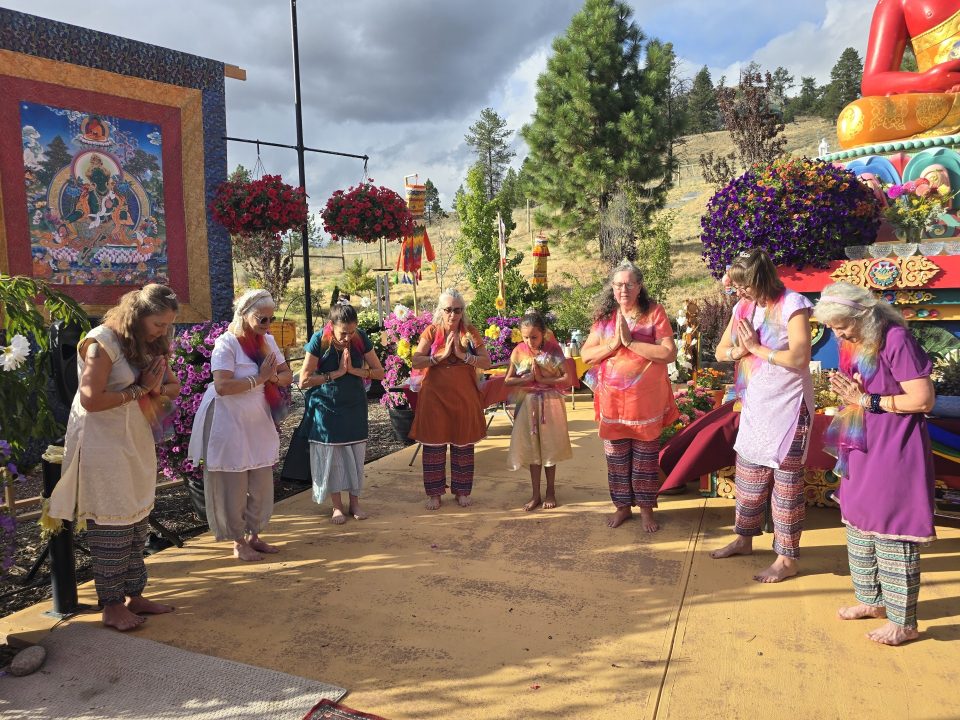
Participants in the Amitabha Buddha Festival, September 14, 2024. Photo by Julia Sanderson.
After the puja, a lovely lunch was offered and students from Pamtingpa Center performed the Dance of the Twenty-One Qualities of Tara. “It was very beautiful and moving,” shares Ven. Tharchin. “In the backdrop behind the dancers was a large thangka of Mother Tara smiling down on everyone.” Next, a good friend of Amitabha Buddha Land and of Pamtingpa Center, Gary Davis, chanted two Native American songs with much devotion.
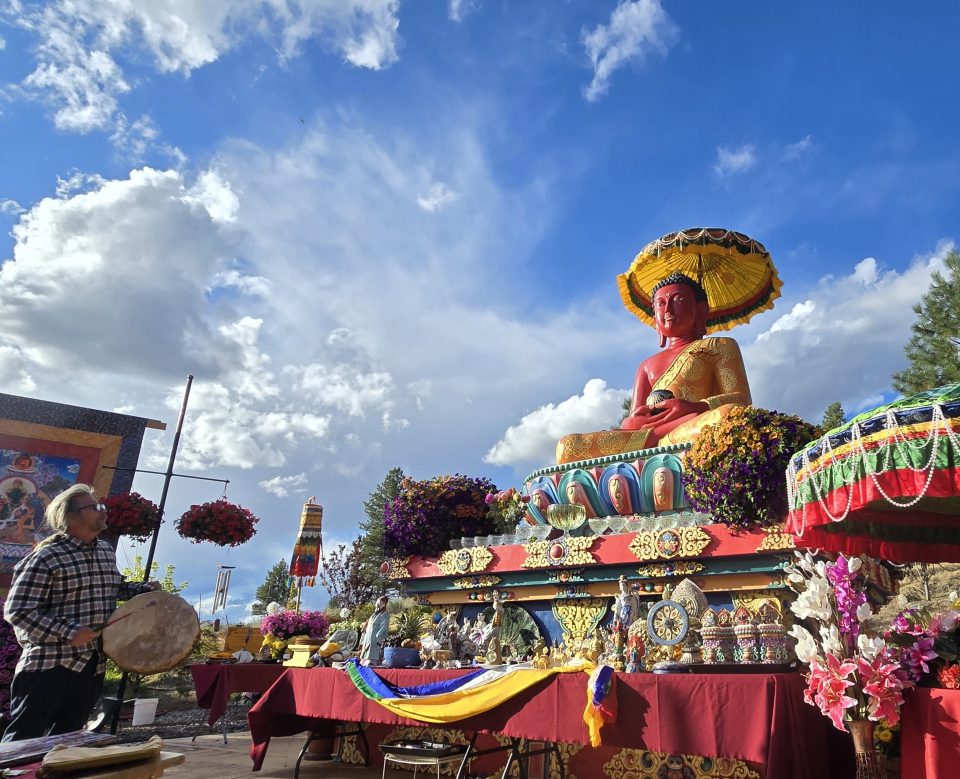
Gary Davis offering chants in front of the Amitabha Buddha statue. Photo by Julia Sanderson.
“One of the chants was about the Aurora Borealis which is held to be very sacred in the tradition and another about paying attention to the voice that comes from the sky,” Ven. Tharchin explained. “It was a wish of Lama Zopa Rinpoche that we represent and include the local traditions in the festival and so we were very grateful that Gary accepted our request to perform.”
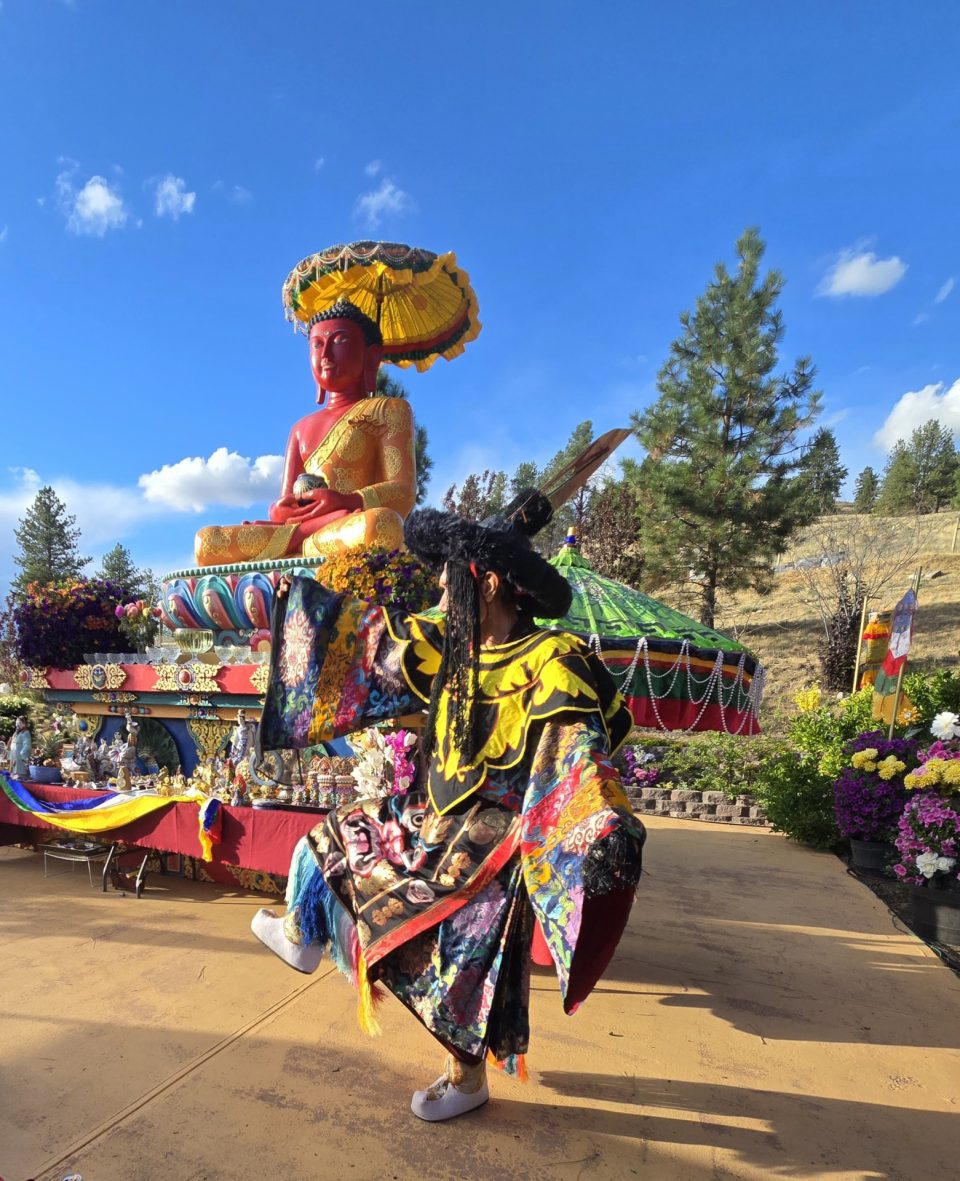
Yangsi Rinpoche offering the Black Hat Dance, September 14, 2024. Photo by Julia Sanderson.
The festivities concluded with Yangsi Rinpoche performing a Black Hat Dance for all. The dance is performed as a method to eliminate and purify obstacles. He had recently been offered a full costume by one of his students when he was in France so he then had the thought to bring the costume with him to the festival and to perform the dance for all. “We asked Rinpoche where he had learned the dance,” Ven. Tharchin shared, “but Rinpoche seemed to indicate he hadn’t actually formally learned it before! You would not have known. Rinpoche performed the dance very elegantly and you could see the depth of concentration in Rinpoche’s eyes as he performed it. Everyone in attendance found it very moving and it was a perfect conclusion to a very special day for all of us.”
With grateful thanks to Ven. Tenzin Tharchin for providing details of this special event and to all who helped make the festival a success.
The Amitabha Festival Book: Extensive Benefits from Now up to Enlightenment (Peerless Happiness), Including Liberation from Saṃsāra (Definite Happiness) is available for all to use. This text is in relation to Amitabha Buddha but it can be used as a basis for another deity by replacing the praises and prayers of Amitabha with those of the deity.
Foundation for the Preservation of Mahayana Tradition (FPMT), is a Tibetan Buddhist organization dedicated to the transmission of the Mahayana Buddhist tradition and values worldwide through teaching, meditation and community service.
- Tagged: amitabha buddha, amitabha buddha festival, buddha amitabha pure land, holy objects, large thangka, vast visions
2
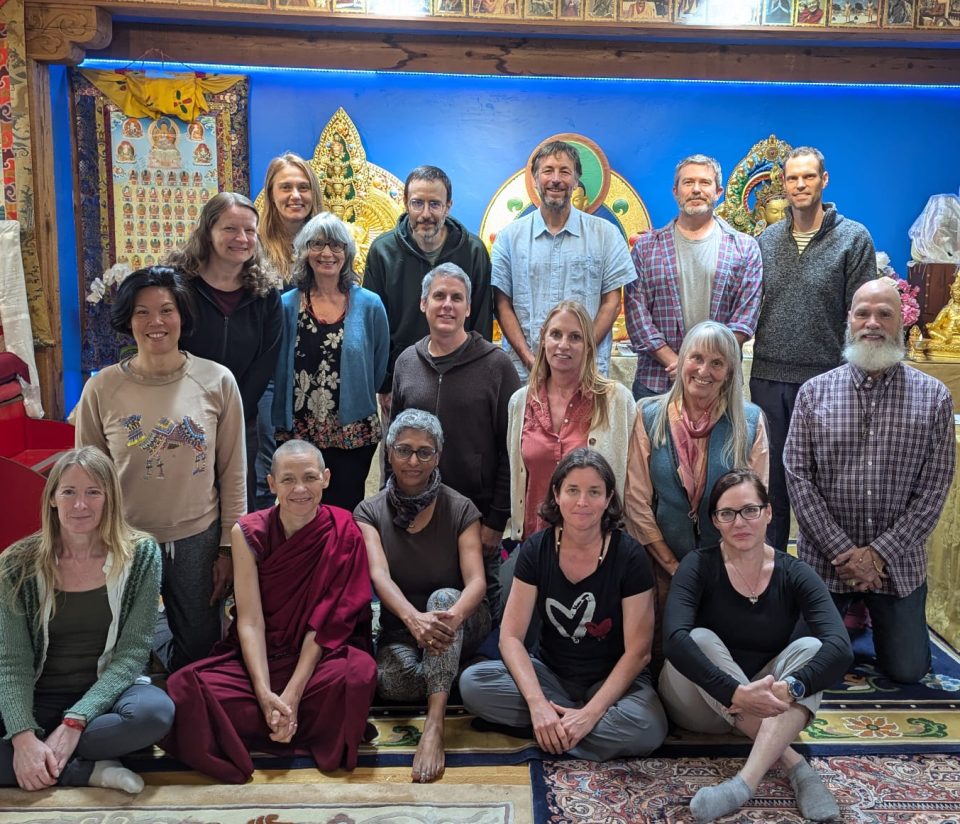
Participants in the recent Foundation Service Seminar Retreat held at Vajrapani Institute from September 10-14.
Led by experienced facilitators Amy Cayton and François Lecointre, the latest Foundation Service Seminar (FSS) held at Vajrapani Institute, USA, from September 10-14, 2024, was a great success, with the 16 participants from seven different FPMT affiliates from the North American Region working joyfully on how to better integrate practice and service. We are pleased to share the following report of this FSS by Nina Highfill, Executive Director of the Thubten Norbu Ling Center in Santa Fe, New Mexico, USA.
FSS and the Family Feeling
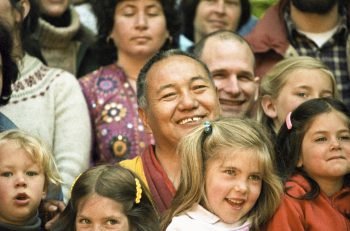
Lama Yeshe during a family gathering at Vajrapani Institute, California, US, 1983. Photo by Carol Royce, courtesy of Lama Yeshe Wisdom Archive.
Lama Yeshe, the founder of the Foundation for the Preservation for the Mahayana Tradition (FPMT), believed that the most important thing for us to thrive as an organization, is to cherish and nurture the family feeling among us. How often do we pause to appreciate the connections we forge in our Dharma practice? The Foundation Services Seminar (FSS) reminded me of the profound impact these relationships have on our journey.
I did not know how important this “family feeling” was to Lama. I didn’t know many things when I arrived at the Vajrapani Institute in California, USA, on a sunny September afternoon, to join the 5-day FSS retreat experience.
The aims of the FSS are to support individuals wishing to offer service at any level within our organization, explore how we can serve in ways that are most beneficial to ourselves and others, and review the guiding principles and structure of FPMT. As I walked into the gompa for the opening session, this was exactly what I expected. However, as the days unfolded, I discovered that I was receiving much more than I had anticipated.
Learning Experience
Nestled among towering redwoods and full of holy objects and relics, the serene atmosphere of Vajrapani was imbued with a palpable sense of peace. Together with 15 fellow FPMT volunteers, we were gently and skillfully guided by the seminar leaders, Amy Cayton and Francois Lecointre, through interactive presentations, discussions and a variety of exercises, introducing us to the FPMT history, structure, programs and projects. We also learned many practical skills, like dealing with stress, learning to communicate more effectively and to deal with complaints or mental health issues.
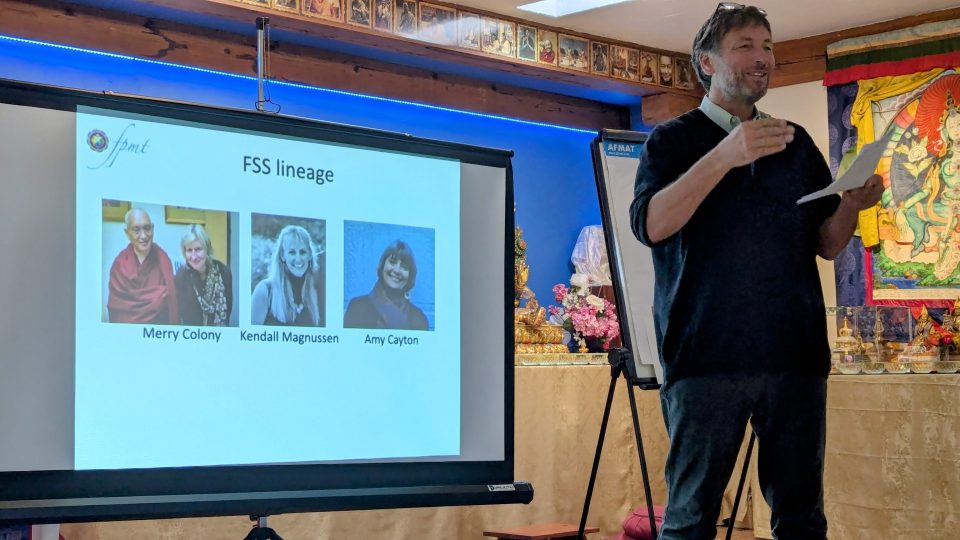
Francois Lecointre leading the FSS at Vajrapani Institute, CA, USA, September 2024. Photo by Nina Highfill.
I was blown away by the richness of the FPMT tradition, culture and program and by the vast scope and huge impact of FPMT’s charitable projects, which not only support the ordained Sangha and provide educational scholarships but also promote social services and animal rescue, all in alignment with Lama Zopa Rinpoche’s vision for a more compassionate world. Did you know that in 2023 alone, as FPMT, we offered almost $3.5 million to charitable projects? Isn’t it a reason to celebrate and rejoice?
Personal Insights
Lama Zopa Rinpoche once said, “The big thing is how to always enjoy when offering service, regardless of what’s going on.” When things get busy and stressful, it is easy to forget this and to spiral down the cycle of frustration, annoyance, and disappointment with ourselves and others. Despite our best intentions, we end up falling into our old, well-ingrained patterns of conflict or dissatisfaction. One of the exercises during the seminar brought it home. We were asked to imagine that we have an important and very urgent task to finish and we are running through the center in stress, while a newcomer is requesting help. We played out two scenarios in pairs—one in our “usual” state of mind and one after reflecting on bodhicitta for a few moments before we responded to the stranger. The type of connection we were all able to generate and the quality and pleasure of the conversation in the second scenario left us with new appreciation that bodhicitta is not an ideal we learn about from ancient texts, but a mindset we can cultivate every day, moment by moment, so that we can enjoy the service and show up for others with kindness, compassion, and openness.
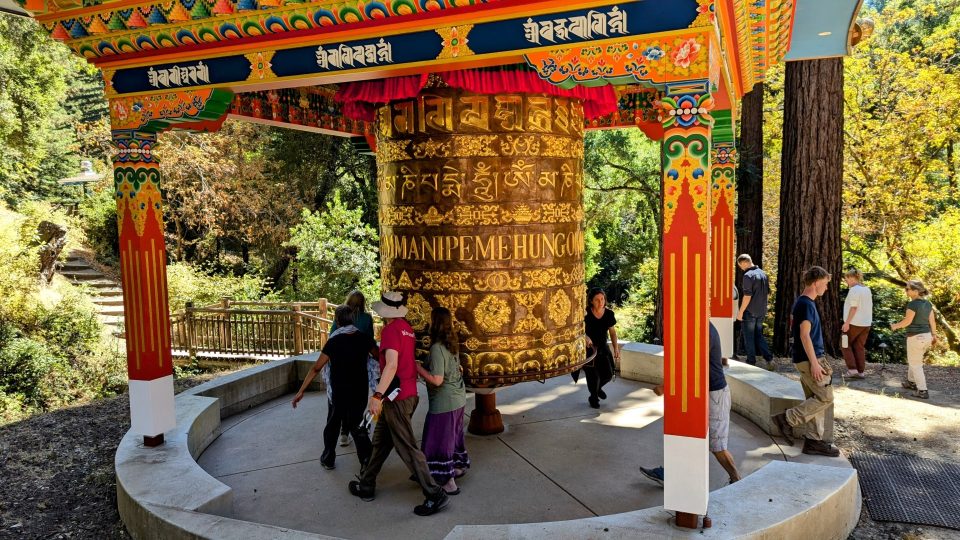
FSS participants circumambulating the prayer wheel at Vajrapani Institute, September 2024. Photo by Nina Highfill.
On a personal level, the FSS helped me to better grasp Lama Yeshe’s and Lama Zopa Rinpoche’s vision for the FPMT and for the role of the centers within it. It was very timely, as at my home center, Thubten Norbu Ling in New Mexico, USA, we are currently working on our 5-year strategy. I took fervent notes throughout the seminar and had a few epiphany moments regarding the direction for our center and our guiding principles. I now feel confident that we have a solid foundation and are moving forward toward fulfilling the founding lamas’ vision and benefiting as many sentient beings as possible.
Concluding Reflections
It was hard to leave the beauty and the profound energy of Vajrapani and the wonderful group of FSS participants. Somewhere in the process, we have not only learned about the “family feeling.” We started to experience it with each other. However, I left California with a new sense of optimism and energy. FPMT is an amazing organization with a unique and vast vision and beautiful values rooted in authentic wisdom and compassion. But most of all, we are a family of warm-hearted, sincere Dharma practitioners, who have an endless amount of talent and wisdom among us. There is nothing we cannot accomplish, if we put our heads and our hearts together!
As we offer service in our respective centers and services, let us remember that we are helping our lamas to realize their vast visions and that our service is our practice and our offering to sentient beings. Let’s offer it with the mind of bodhicitta and a sense of joy. And if you ever feel in need of inspiration and warm connection, remember to look up and join the next Foundation Services Seminar!
Nina Highfill, currently the Executive Director of The Buddhist Center Thubten Norbu Ling in Santa Fe, NM, USA, is the founder and former director of the Lhagsam Center in Zurich, Switzerland. She is a devoted student of Lama Zopa Rinpoche and currently lives in Crestone, Colorado. Originally from Poland, she loves traveling to Nepal and considers Kopan Monastery her spiritual home. She loves reading, studying, running, and being in the nature.
Chandrakirti Centre, New Zealand, is hosting an FSS from November 6-10. Read more information and reserve your place.
To learn more about the FPMT Foundation Service Seminar:
https://fpmt.org/education/training/#fss
Foundation for the Preservation of Mahayana Tradition (FPMT), is a Tibetan Buddhist organization dedicated to the transmission of the Mahayana Buddhist tradition and values worldwide through teaching, meditation and community service.
- Tagged: foundation service seminar, FSS
27
Welcome to Our September e-News!
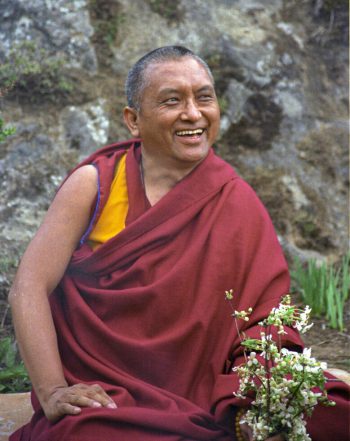
Lama Zopa Rinpoche at Lawudo Retreat Centre, Nepal. Photo by Ven. Roger Kunsang, date uncertain. From the LYWA collection.
This month’s e-news brings you important news, updates, and causes for rejoicing including:
- How to help the devastating situation in Thame
- Teachings from Lama Zopa Rinpoche and Lama Yeshe
- Information on this year’s Kopan November Course
- Writing out the Prajnaparamita for as long as FPMT exists
- An update on regional consultations paving the way for CPMT 2025
- Newly available and revised materials for your practice
- Changes and opportunities in the organization
And so much more!
Please read this month’s e-news in its entirety.
Have the e-News translated into your native language by using our convenient translation facility located on the right-hand side of the page.
Visit our subscribe page to receive the monthly FPMT International Office e-News directly in your email inbox.
- Tagged: fpmt enews
16
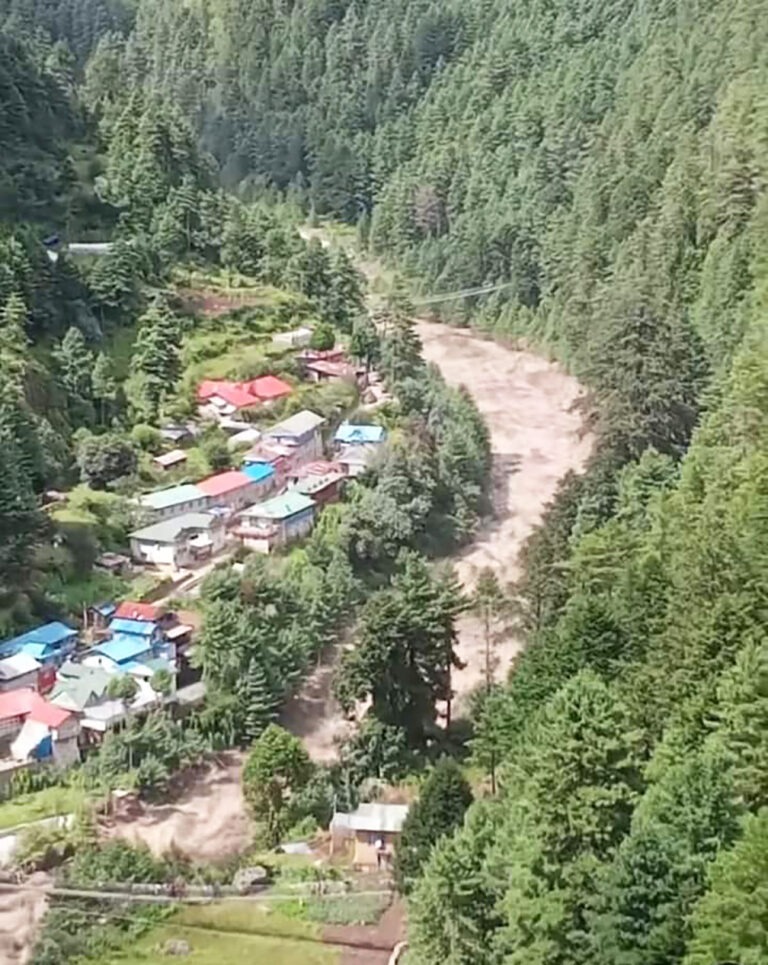
Flood of August 16 tearing through a village on the way to Namche Bazaar, Nepal. Photo courtesy of Khabarhub.
Co-director of Lawudo Retreat Centre, Frances Howland reports on the flood that struck the village of Thame, Nepal, birthplace of Lama Zopa Rinpoche:
In a tragic event, the village of Thame in the Solu Khumbu district of Nepal, was devastated by a catastrophic flood on August 16, 2024. Thame holds a special place in our hearts as the birthplace of Kyabje Lama Zopa Rinpoche. It is also the home to many Kopan monks and nuns including Charok Lama, and a number of legendary mountain climbers.
The flood was triggered by a sudden glacial lake outburst. This sent a torrent of water hurtling down the mountain slopes, filled with mud and debris, the water surged down with a deafening roar, giving villagers just enough time to flee to safer, higher ground.
Miraculously there was no loss of human life, had it happened at night human casualties would likely have been unavoidable. Thame, at 12,450 feet (3,800 meters) usually has a population of 300 Sherpa people who depend mostly on trekking and mountaineering for their livelihood. Due to the off-season for tourism, there were few people in the village.
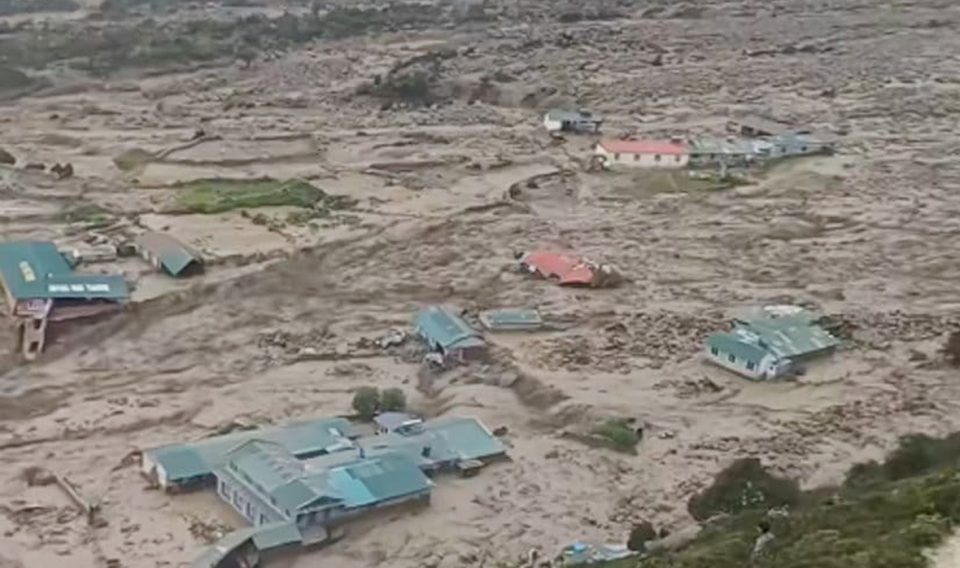
Some of the devastation from the flood in Thame village, August 16, 2024. Photo courtesy of Khabarhub.
Villagers left behind their houses, hotels, animals, and everything they owned. About half of the village has been destroyed or severely damaged, including the school and health clinic, plus vital infrastructure. The dam and hydroelectric plant that provide electricity to the whole valley, including Lawudo Retreat Centre and the main town of Namche Bazaar, were severely damaged. Several bridges were washed away and the walking trail to Thame was swept away.
Lama Zopa Rinpoche’s birth house, and the prayer wheel next to it, were spared. Water came up to the prayer wheel house but did not enter inside. The prayer wheel, inaugurated in 2022, contains 100 trillion mantras on microfilm. Rinpoche lived his early years in Thame village with his family, until he was recognized at a young age as the reincarnation of the Lawudo Lama, Kunzang Yeshe, who was also from Thame, but had spent his later life meditating in the Lawudo cave.
The ancient, historic Thame Monastery located high up on the ridge was unaffected by the flood.
Thame was also seriously damaged during the 2015 earthquake. Almost all of the homes in the area were damaged or destroyed and several people died. The Thame Stupa was then rebuilt under Lama Zopa Rinpoche’s financial assistance and direction, completed in 2020. It is located over the ridge in Thame Teng, this area was not affected by the flood.
The Lawudo Retreat Centre, a couple of hours walk from Thame, the home of Rinpoche’s previous incarnation, is home to Rinpoche’s sister, Anila Ngawang Samten. A number of FPMT sangha are currently in retreat there. Lawudo has no electricity due to the flood, but it was not affected by the floodwaters as it lies further down the valley high up on a ridge.
Immediately following the disaster, the Nepal Police and Army were dispatched to help and rescued some trapped animals. In the following days the local people salvaged any personal belongings they could find in the mud and debris that was left behind. However, questions remain about the safety of rebuilding in this area. There are several glacial lakes above Thame. These lakes forming, becoming larger, and then bursting has become increasingly common in the Himalayas due to rising global temperatures.
A video clip of this devastating flood can be viewed:
https://www.youtube.com/watch?v=VwJb34aOx7Y
FPMT International Office, through the Social Services Fund, is working with Kopan Helping Hands to offer support directly on the ground in Thame, where it is most needed now and in the future as the situation and urgent needs become clearer. Please consider offering support at this most critical time:
https://fpmt.org/support/
Please look for more information regarding this coming soon.
With grateful thanks to Frances Howland for providing the FPMT community with this moving report.
Foundation for the Preservation of Mahayana Tradition (FPMT), is a Tibetan Buddhist organization dedicated to the transmission of the Mahayana Buddhist tradition and values worldwide through teaching, meditation and community service.
- Tagged: thame, thame flood, thame support fund
13
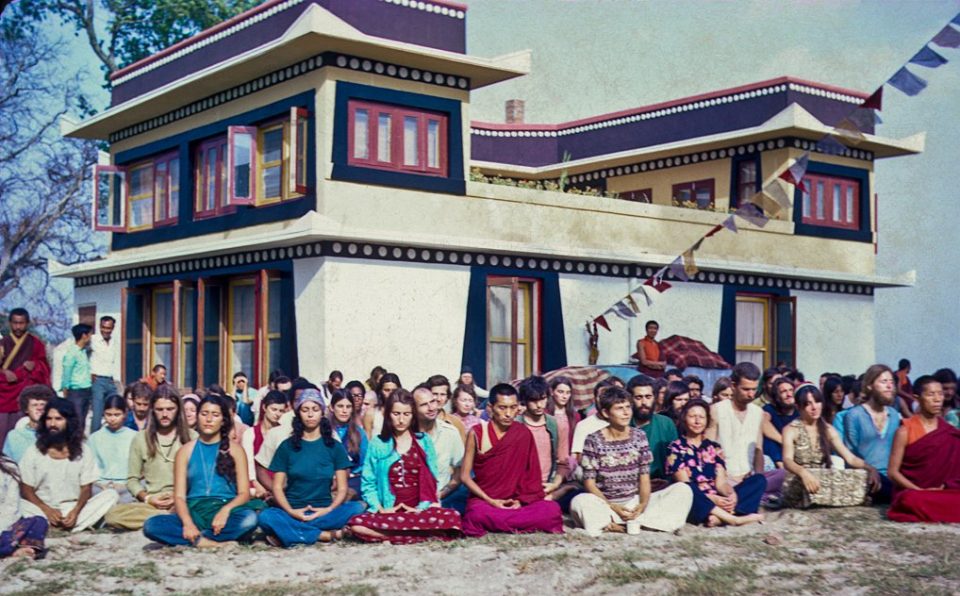
Lama Zopa Rinpoche in a group photo from the Fourth Meditation Course, Kopan Monastery, spring, 1973. Photo courtesy LYWA Collection.
Kopan Monastery’s yearly month-long lamrim course, known affectionately as the November Course, will be held from November 8 through December 8, 2024 in Nepal. Registration for this course is open and there are still spots available!
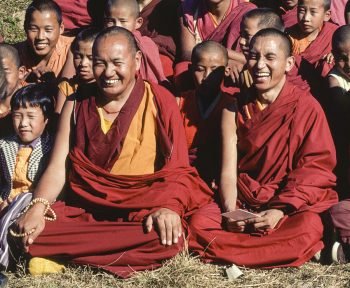
Lama Yeshe and Rinpoche at the 11th Kopan Meditation Course, Kopan Monastery, Nepal, 1978. Photo by Murray Wright, courtesy of the Lama Yeshe Wisdom Archive.
In 2017, Rinpoche told the attendees of the famous Kopan November Course, “So it is really of the utmost importance, you coming here to learn not just meditation but lamrim, lamrim meditation. … Only then, you can understand how to live life, how in the past how you live, and how you should live now, in a positive way to benefit not only yourself but all the numberless beings. So I want to say, your coming to Kopan to do meditation course, oh, this is the best! If you want to help the world, to bring peace, your coming here is the best. Your coming here to do the meditation course, to learn, that is the best. You have to bring peace in the world by your mind, by your good heart. You yourself have to have a good heart to bring perfect peace and happiness in the world. That is the best. … Coming to a Kopan Course is the most important education of your life.”
The first course was offered in 1971 with a dozen of students in attendance, and over the years, an average of 200 spiritual seekers from diverse backgrounds have received the immense blessings of this legendary course. Many of FPMT’s senior students first met Lama Yeshe and Lama Zopa Rinpoche after walking up the beautiful and holy Kopan hill for the month-long retreat. This historic course is responsible for the lamas’ teachings spreading throughout the West as these students established FPMT centers around the world.
The course still follows the exact same structure set up by the lamas. This year, one of FPMT’s first Western students, Tubten Pende (aka Jim Dougherty), will be leading the course. Since 1972, Pende has been offering service in so many ways to FPMT.
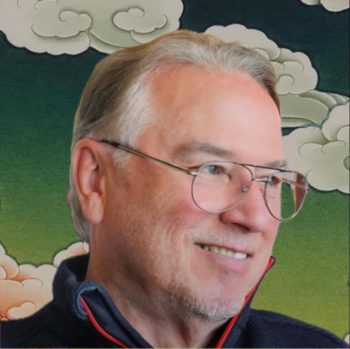
2024 Kopan November Course teacher, Tubten Pende.
“Tubten Pende is one of FPMT’s most senior teachers,” says Merry Colony, former director of FPMT Education Services. “As a monk Pende studied with Khensur Jampa Tegchok at both Manjushri Institute and Nalanda Monastery for many years. Pende was instrumental in getting the FPMT Masters Program off the ground and headed up FPMT’s Education Department in the 1990s. Later he was one of the FPMT senior teachers invited to help formulate the Discovering Buddhism program. Since its inception, Pende has been involved with the program, first as a teacher of module 12, the Wisdom of Emptiness, and later as an elder for the DB online forum and assessor for DB certificate students. Pende has always stood out as an exceptional teacher of all topics, but most especially emptiness, having the very sharp analytical mind necessary for delving deeply into this profound topic. Pende’s presentations are always exceptionally clear and to the point.”
This will be Pende’s third time teaching the course; he also taught in 1985 and 1994. Attending this course is an incredibly precious opportunity, and receiving these teachings from Tubten Pende is a true blessing.
For more information on this year’s course and to register, please visit Kopan Monastery’s website: https://kopanmonastery.com/courses-retreats/courses/november-course
You can watch videos of Lama Zopa Rinpoche teaching the 2022 November Course and download a full transcript of the entire event.
Please read the story about how the Kopan courses began.
Here’s a taste of the teachings given at Kopan Courses starting from the earliest days.
Foundation for the Preservation of Mahayana Tradition (FPMT), is a Tibetan Buddhist organization dedicated to the transmission of the Mahayana Buddhist tradition and values worldwide through teaching, meditation and community service.
- Tagged: kopan course, November course
11
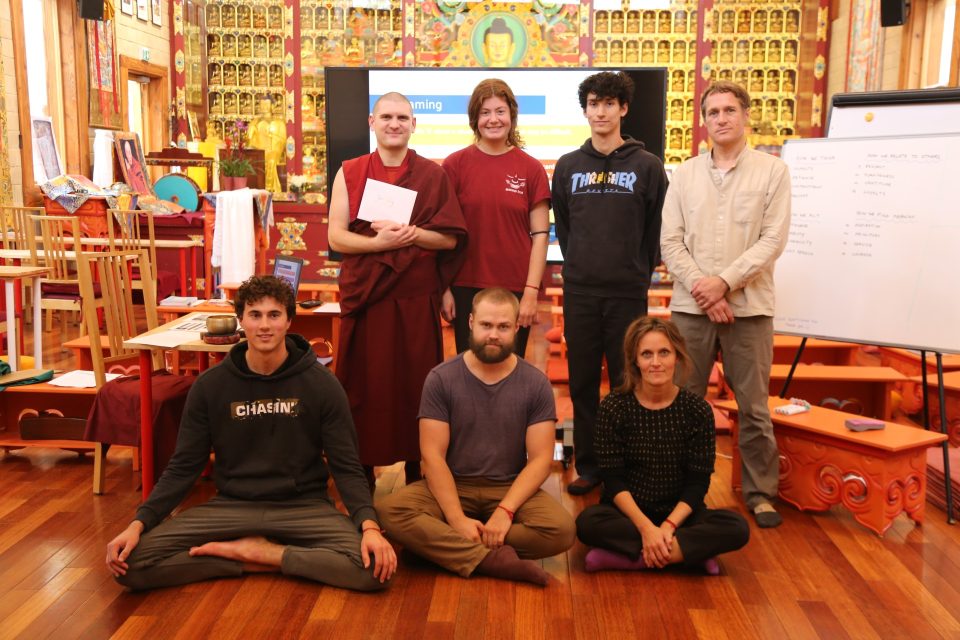
Ven. Thubten Jamyang with Nalanda Monastery volunteers who participated in FDCW’s 16 Guidelines.
FDCW (Foundation for Developing Compassion and Wisdom) brings us some wonderful initiatives, available
to those interested in understanding their own mind and emotions and bringing compassion into daily life. In 1983 Lama Yeshe began formulating the idea of Universal Education. “The world needs a new system of education because the old one is too dated for the intelligent people of today and produces a great deal of conflict and dissatisfaction in the present generation. […] We have to get rid of people’s old concepts and give them a new imagination; a new, broad way of looking at themselves and the world. That’s what I mean by “universal.”
Executive director of FDCW, Victoria Coleman, shares a success story about how Universal Education, via the 16 Guidelines for Life, worked within a particular FPMT community, Nalanda Monastery in France:
Foundation for Developing Compassion & Wisdom is passionate that everyone has the chance to live their best life. We believe the key is cultivating a warm heart and a wise mind. The Foundation was inspired by the late Lama Yeshe who saw the importance of a new kind of education. He named it Universal Education. Its aim is for people to fulfil their incredible potential and live their best lives – for themselves and for others.
The Foundation’s Patron, His Holiness the Dalai Lama says, “Each of us must learn to work not just for his or her own self, family, or nation, but for the benefit of all humankind. Universal responsibility is the real key to human survival.”
The Foundation’s core program is the 16 Guidelines for Life. The Foundation has trained a global network of facilitators spread across 21 countries dedicated to sharing these techniques for happiness. Ven. Thubten Jamyang is a 16 Guidelines facilitator as well as a psychologist and a carer. Here he shares what happened when he introduced the 16 Guidelines to volunteers living at Nalanda Monastery in France:
“I decided to offer 16 Guidelines to volunteers at Nalanda because we needed to offer them something besides Dharma. Not many of them came here for the Dharma. They came with different motivations. Universal education is suitable for all seekers. Those who don’t know why they came, and those who are looking for some answers.
“The course ran on Saturdays for eight weeks with each session lasting just over two hours. It was quite a small group of six participants. I decided not to allow people to ‘drop into’ sessions without completing the whole course. I felt that this was important for maintaining the group stability.
“At the very beginning, I stressed the importance of practicing between sessions, and to my delight, they enthusiastically embraced the ‘homework.’ I began by sharing a little of my own story so that participants got to know me a bit. Being open encourages a spirit of openness in the group. This helped to create safety and trust within the group.
“The group was harmonious and not too big for me to handle. They had enough time and space to ask questions and to share their experience all within the time limit for each session. I could see that with bigger groups, I would probably need to shorten some discussions. It helped that the group was already working together as volunteers and was in fact one of the best volunteer groups we have had at Nalanda.
“Our sessions took place in the afternoon just after lunch and so sometimes we felt a bit sleepy. Halfway through the course I had the idea of asking someone who knows tai chi to offer this to the group during the middle of the session. The 10 minutes of tai chi worked very nicely and was appreciated by the volunteers. Personally, I found that I felt more energetic after that short exercise. I have also noticed participants filling out their learning logs throughout the course. It is another way to integrate their learning and to reflect.
“After the eight sessions were completed, the group continued meeting each week for discussions on the 16 Guidelines. These weekly discussions and sharing will continue until the time when the volunteers move on from Nalanda. Actually a few of them became Basic Program students at Nalanda.”
One of the volunteers who participated, Omar, shared, “I’ve very much enjoyed the 16 Guidelines course in its ability to present wholesome and relatable content. You don’t need to be a Buddhist to understand the shared values we can adopt that can unite all of us as a human family.”
To begin your 16 Guidelines journey today, check out the course, app and book all available from the FDCW website.
To learn more about the origins of FDCW, please explore a three part video series of Lama Zopa Rinpoche speaking about Universal Education in 2005.
Foundation for Developing Compassion and Wisdom (FDCW) provides secular training, programs and resources across many sectors of society – schools, universities, hospices, workplaces, healthcare, youth groups and community centers.
- Tagged: 16 guidelines, fdcw
6
Merit Box Grants Have Been Awarded for 2024
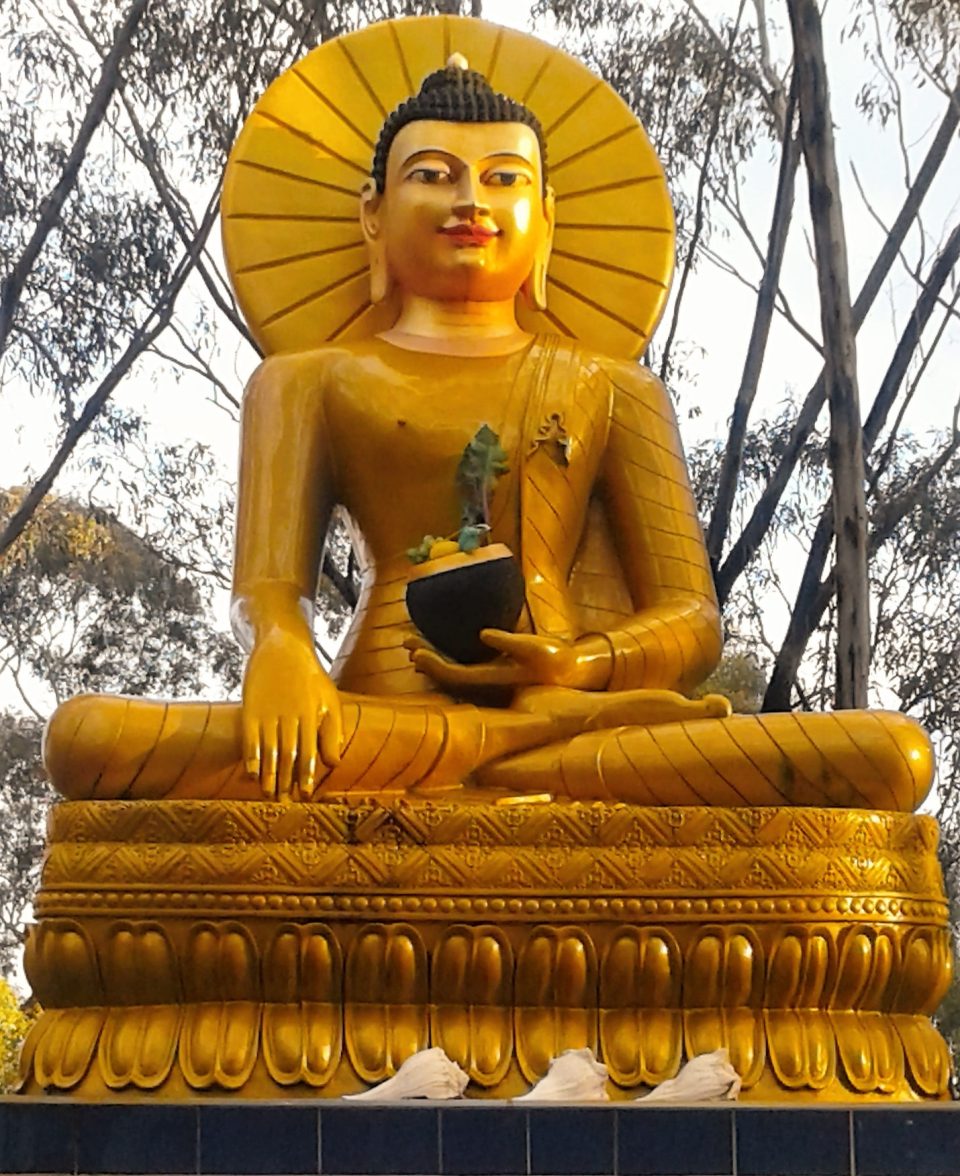
Atisha Centre in Australia received two 2024 Merit Box grants to refurbish their golden Buddha statue and complete their Kadampa stupa project. Photo courtesy of Atisha Centre.
The International Merit Box Project was created in order to cultivate generosity as part of a daily practice and in turn help provide resources for local projects that are fulfilling the FPMT mission. The program began in 2001 with students and communities keeping a small Merit Box on their altars or elsewhere to make and collect offerings in. Although new physical Merit Boxes have not been distributed in recent years, offerings are still being collected from FPMT students, centers, projects and services worldwide.
The collected offerings are disbursed annually as grants supporting a wide range of Dharma activity. To date, 370 grants have been awarded over the years, with US$1,258,580 in total being disbursed! This generosity has provided needed aid for holy objects, book publishing, retreat sponsorship, social service projects, translation work, Dharma libraries, education initiatives and trainings, and many Dharma activities!
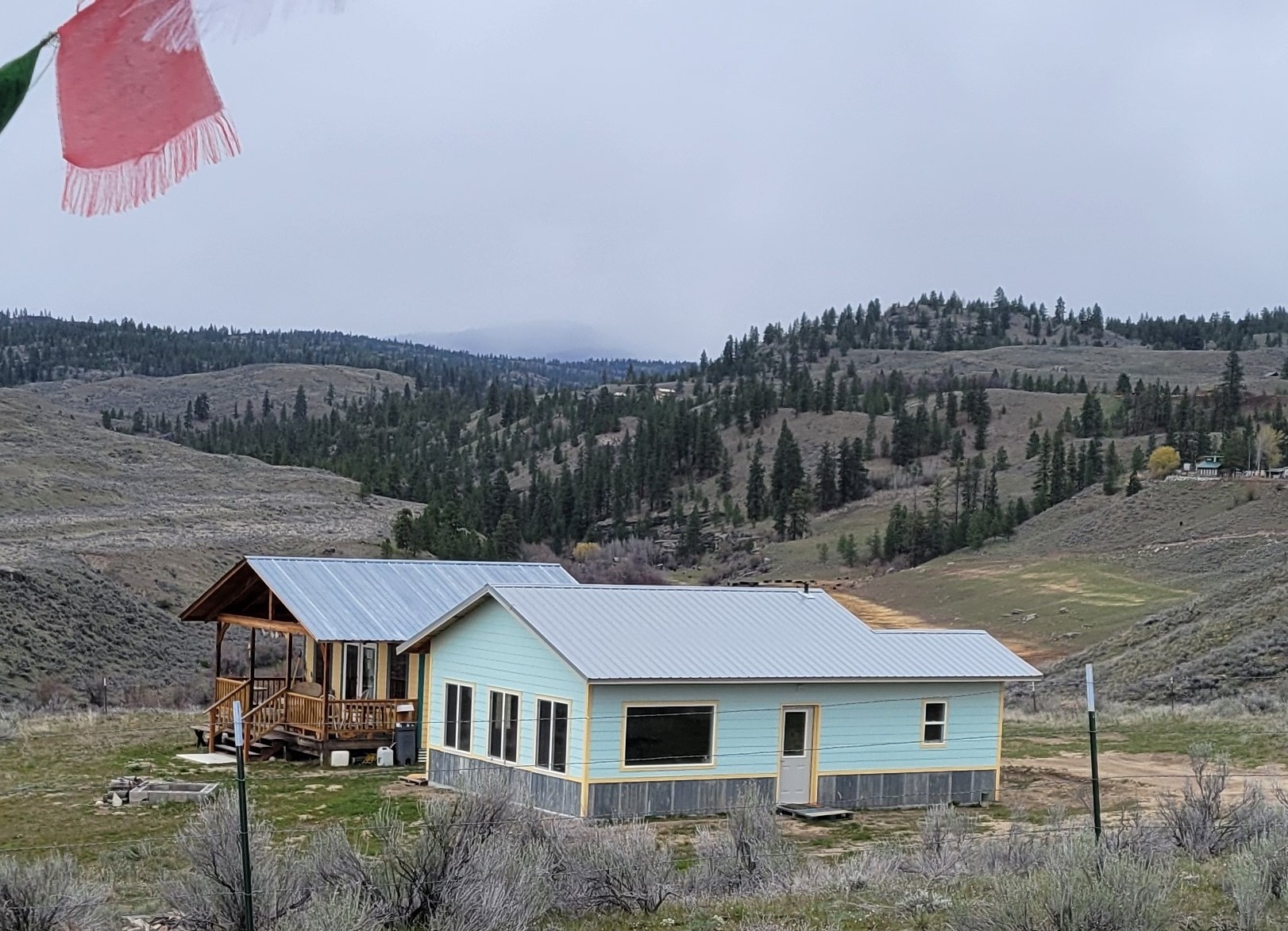
The gompa and community house for Pamtingpa Center, Washington, USA. The center received a 2024 Merit Box grant to build a septic system for the building.
Recently, US$19,000 in grant awards for the 2024 giving cycle were disbursed through the Merit Box Fund for sixteen projects of FPMT communities in Australia, France, Italy, Mongolia, Romania, Spain, the United Kingdom and the United States.
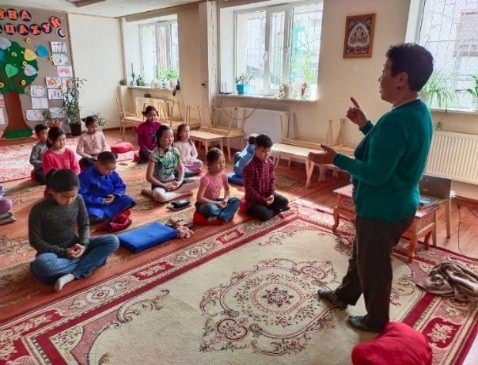
FPMT Mongolia received a 2024 Merit Box grant for their Mahayana Children’s Program. Photo courtesy of FPMT Mongolia.
Projects that received funding include a translation of Lama Zopa Rinpoche’s new book The Power of Meditation into Italian, FPMT Mongolia’s Mahayana Children’s Program, and the Planetary Crisis Summit hosted by Jamyang Buddhist Centre in London earlier this year. Grants have also provided aid for a number of repairs and renovations to center facilities, making the entrances to Tse Chen Ling’s center in the USA accessible for people with disabilities, and to help build a septic system for the rural buildings of Pamtingpa Center, USA. Other grants have been awarded supporting eight holy objects – stupas, statues, prayer wheels and thangkas.
The full list of grant recipients can be found here. A huge thanks to all of the generous donors to the Merit Box Fund who have made these grants possible!
Foundation for the Preservation of Mahayana Tradition (FPMT), is a Tibetan Buddhist organization dedicated to the transmission of the Mahayana Buddhist tradition and values worldwide through teaching, meditation and community service.
- Home
- News/Media
- Study & Practice
- About FPMT Education Services
- Latest News
- Programs
- New to Buddhism?
- Buddhist Mind Science: Activating Your Potential
- Heart Advice for Death and Dying
- Discovering Buddhism
- Living in the Path
- Exploring Buddhism
- FPMT Basic Program
- FPMT Masters Program
- FPMT In-Depth Meditation Training
- Maitripa College
- Lotsawa Rinchen Zangpo Translator Program
- Universal Education for Compassion & Wisdom
- Online Learning Center
- Prayers & Practice Materials
- Overview of Prayers & Practices
- Full Catalogue of Prayers & Practice Materials
- Explore Popular Topics
- Benefiting Animals
- Chenrezig Resources
- Death & Dying Resources
- Lama Chopa (Guru Puja)
- Lama Zopa Rinpoche: Compendium of Precious Instructions
- Lama Zopa Rinpoche: Life Practice Advice
- Lama Zopa Rinpoche Practice Series
- Lamrim Resources
- Mantras
- Prayer Book Updates
- Purification Practices
- Sutras
- Thought Transformation (Lojong)
- Audio Materials
- Dharma Dates – Tibetan Calendar
- Translation Services
- Publishing Services
- Teachings and Advice
- Find Teachings and Advice
- Lama Zopa Rinpoche Advice Page
- Lama Zopa Rinpoche: Compendium of Precious Instructions
- Lama Zopa Rinpoche Video Teachings
- ༧སྐྱབས་རྗེ་བཟོད་པ་རིན་པོ་ཆེ་མཆོག་ནས་སྩལ་བའི་བཀའ་སློབ་བརྙན་འཕྲིན།
- Podcasts
- Lama Yeshe Wisdom Archive
- Buddhism FAQ
- Dharma for Young People
- Resources on Holy Objects
- Ways to Offer Support
- Centers
- Teachers
- Projects
- Charitable Projects
- Make a Donation
- Applying for Grants
- News about Projects
- Other Projects within FPMT
- Support International Office
- Projects Photo Galleries
- Give Where Most Needed
- FPMT
- Shop
Translate*
*powered by Google TranslateTranslation of pages on fpmt.org is performed by Google Translate, a third party service which FPMT has no control over. The service provides automated computer translations that are only an approximation of the websites' original content. The translations should not be considered exact and only used as a rough guide.When you meet miserable conditions, it is extremely important to use skillful means. In other words, there is a meditation to mix with whatever suffering you experience. When you apply the teachings in this way, all sufferings are mixed with virtue. All experiences of suffering become virtue.







